THE ELEPHANT

ACADEMIC GROWTH | PERSONAL GROWTH | EMPOWER | THRIVE


ACADEMIC GROWTH | PERSONAL GROWTH | EMPOWER | THRIVE
TOORAK COLLEGE
Old Mornington Road, Mount Eliza, VIC, 3930 PO Box 150, Mount Eliza, VIC, 3930
Senior School: (03) 9788 7200
Wardle House: (03) 9788 7258
CRICOS Provider Code: 00349D
CRICOS Course Code: 005454G (Senior)
097816B (Primary)
DESIGN
Domenic Minieri
Community Office
EDITORIAL TEAM
Emma Castles and Domenic Minieri
Community Office
EDITORIAL CONTRIBUTORS
Staff, students and Collegians
PHOTOGRAPHY
Community Office, Cliff Elliott, Michael Moynihan, Marcus Struzina, staff and students
Southern Impact southernimpact.com.au
Gathered within this captivating image are second and third generation families that have united to mark our 150th anniversary, symbolising our enduring legacy and commitment to the future.
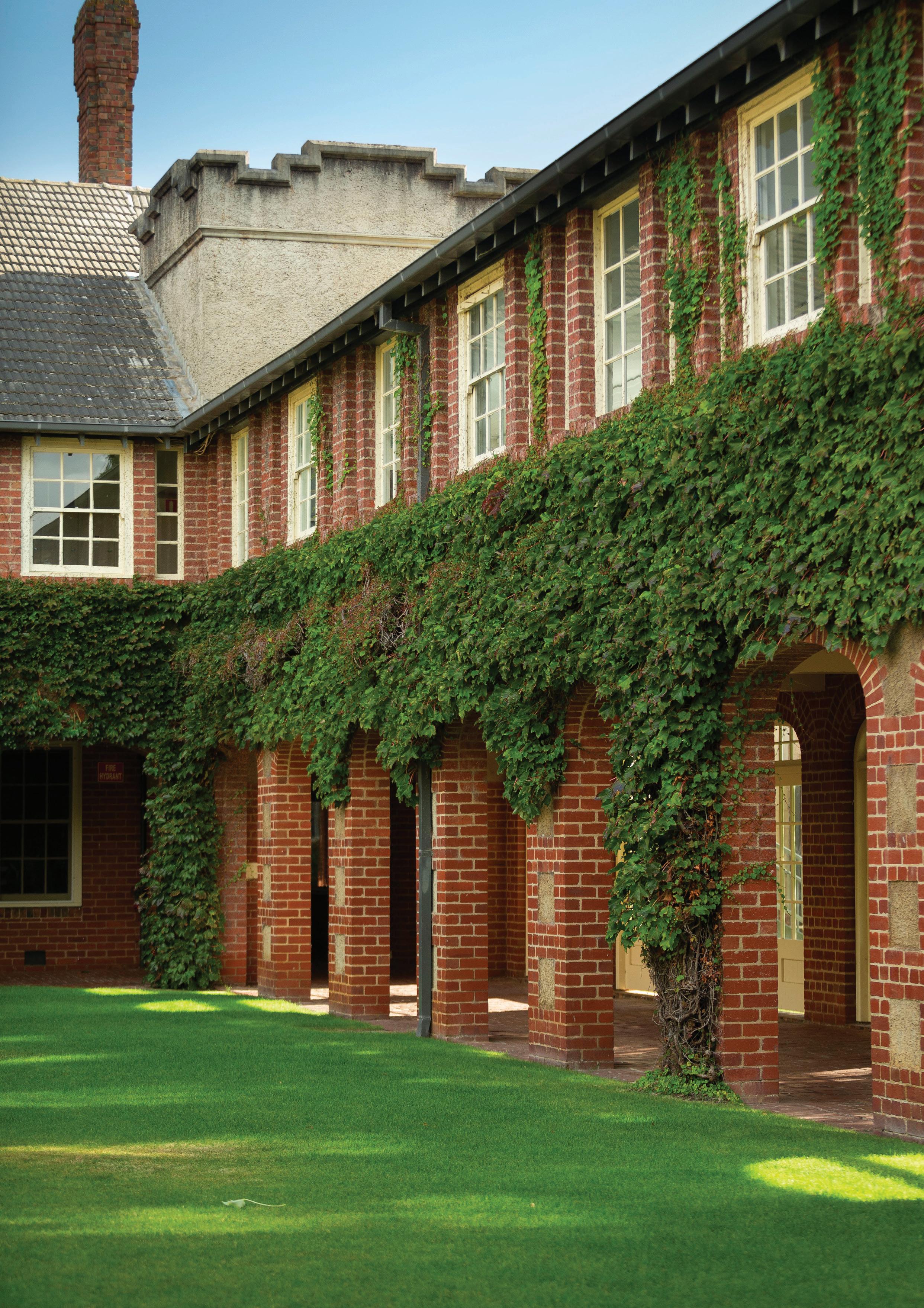
I have a picture in my office that I have never rotated out of being on display. It shows a girl on a journey; she starts as a chalk outline, and comes into form as she walks. The chalk outline transitions to a full-colour image of the girl in one beautiful moment in time, then again she walks, returning to her chalk outline form, but this time she is complete. This picture reminds me of my job and of the work of schools. We help young people to grow and take form –we have a perfect moment in time with them and then they float into the world to do great things. This is a school’s legacy; this is Toorak’s legacy.

For 150 years, Toorak has prioritised the education and development of young people and for much of that journey our school has been centred around the progression of young women. Although we are well known for our historic Hamilton Building and our landscaped grounds, physical things are not where legacies lie – they lie in the people. Inspired in the walls of Toorak are creative thought, expectations of breaking down barriers, innovation, and a culture of lifting one another up and celebrating each other’s successes. The courage that is formed, the dreams that are seeded, and the friendships that are solidified inspire the legacy that travels beyond our gates, just like in my picture.

There are countless tales of Collegians who have gone on to do great things: some of the country’s earliest doctors and aviators are Toorak Collegians, some of Australia’s greatest playwrights and designers are Collegians, some of our country’s most inspiring entrepreneurs and leaders are Collegians.
It is not solely in these stories that we see our school's legacy, but also in their impact on the broader community. Legacy lies in every Collegian who chooses to follow their path. Legacy lies in the pride you feel to have confidence in yourself. And legacy lies in the way we continue to create ripple effects so that others can be empowered to follow their dreams too.

COMMEMORATE OUR LEGACY
Pre-order your copy of A Red Ribbon Runs Through It, the commemorative book celebrating 150 years of Toorak College.
 BY MELISSA SCHOORMAN
Head of Wardle House, Deputy Principal
BY MELISSA SCHOORMAN
Head of Wardle House, Deputy Principal
When it comes to education there is often passionate debate between those that believe in inquiry-based learning and those who value explicit and direct instruction. This philosophical dispute has been heard in our profession for years and essentially, there is no one right way or winner in this perennial argument. Here at Toorak, we believe a hybrid model that values the best of both teaching and learning philosophies is essential, as it builds the necessary foundation for our students to shine and showcase their skills.
There is no doubt that as students transition from school, they are required to think critically and analytically about their tasks in a dynamic work environment. As many of the fields of work that our students will enter are constantly evolving and shifting, it is paramount that our students learn to harness their critical thinking skills to ask and clarify questions. Teaching children to do this independently at a young age allows us to trust that we are instilling their drive and motivation to not only see tasks through to completion but also feel the joy and satisfaction that come from fulfilling any challenge set for them.
This is what we are hoping to achieve in our new Junior School curriculum. Our aim is to provide opportunities for our students to think deeply about matters that are important in their lives and to promote their capacity to ask questions, deduce findings, and identify problems in situations where they wish to have an impact. We are moving our students’ focus away from being problem solvers and toward realising that not every problem they identify can be solved in one swift step. Through inquiry-based tasks, our young learners will develop the key skills to question, analyse, predict, collaborate and iterate so that their learnings are not stagnant or linear. This process will also assist them to appreciate that learning can, and should, be a collaborative process which will equip them to work with, alongside and from others’ ideas and creations. Their active learning will also give our students an awareness of the community that surrounds them and provide connections between one field of expertise and the next.
We believe that with these skills in their toolkits, our Junior School students will be equipped for success and will become influential learners as they move through the Senior School and beyond our Toorak College gates.
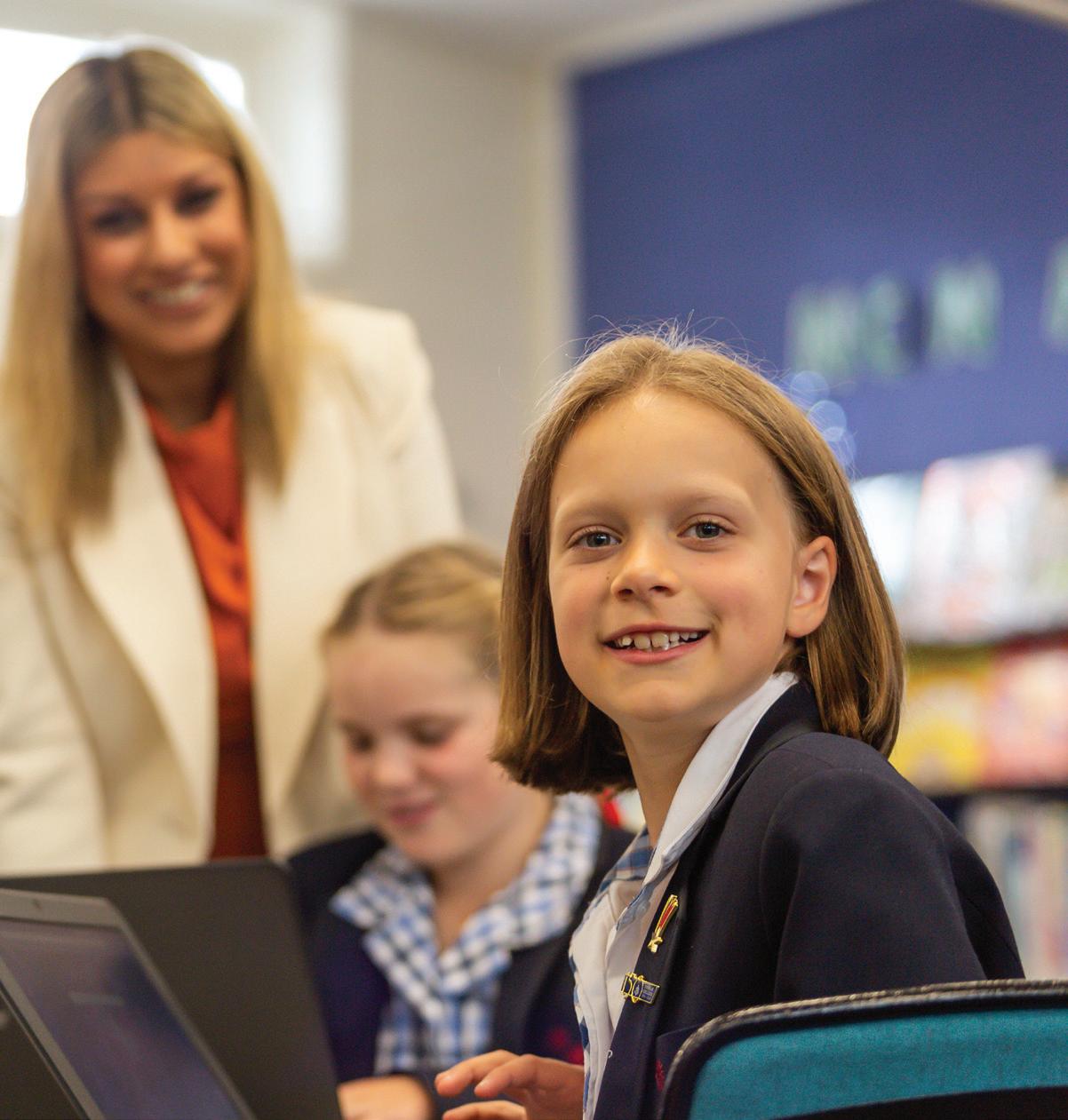
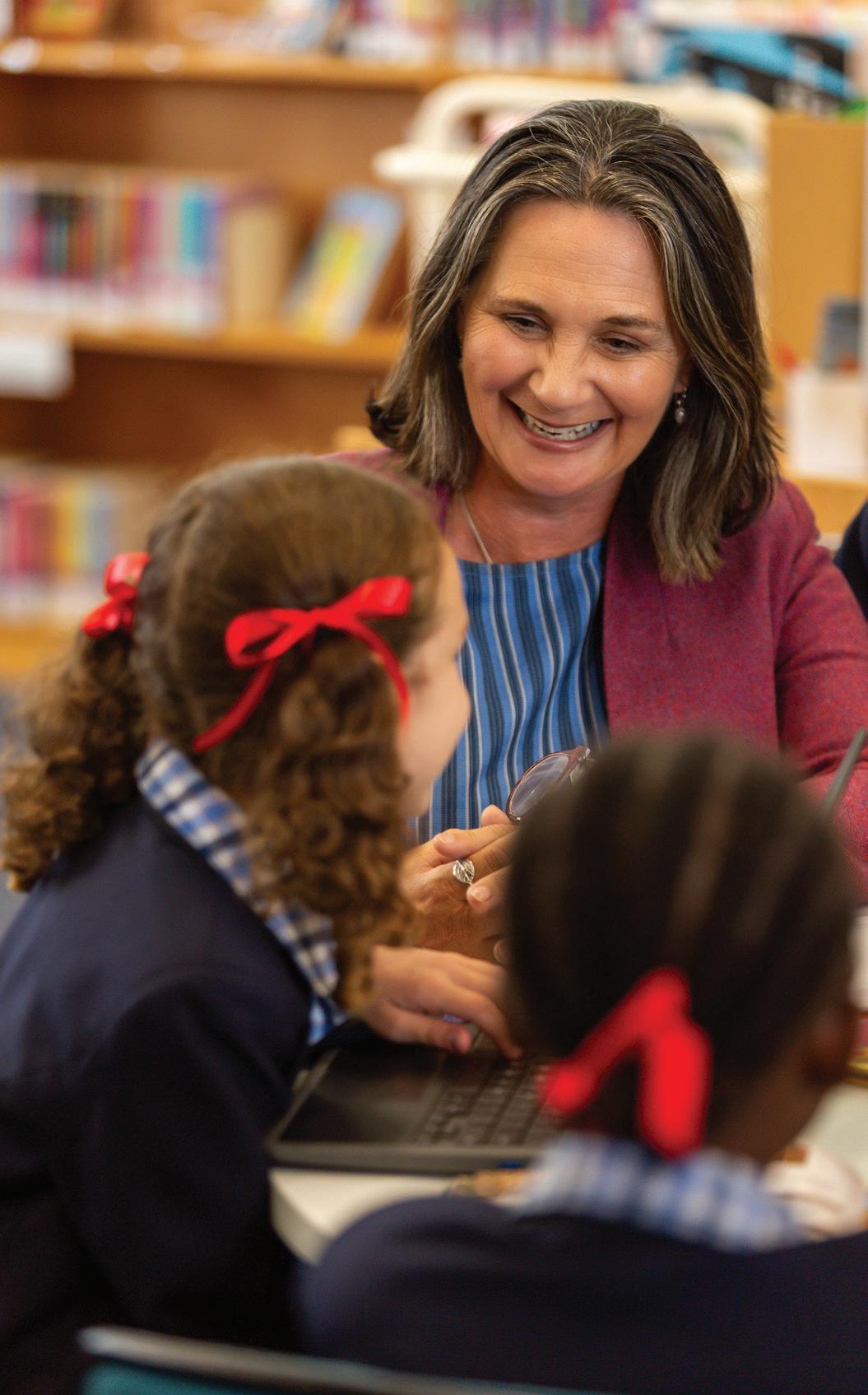
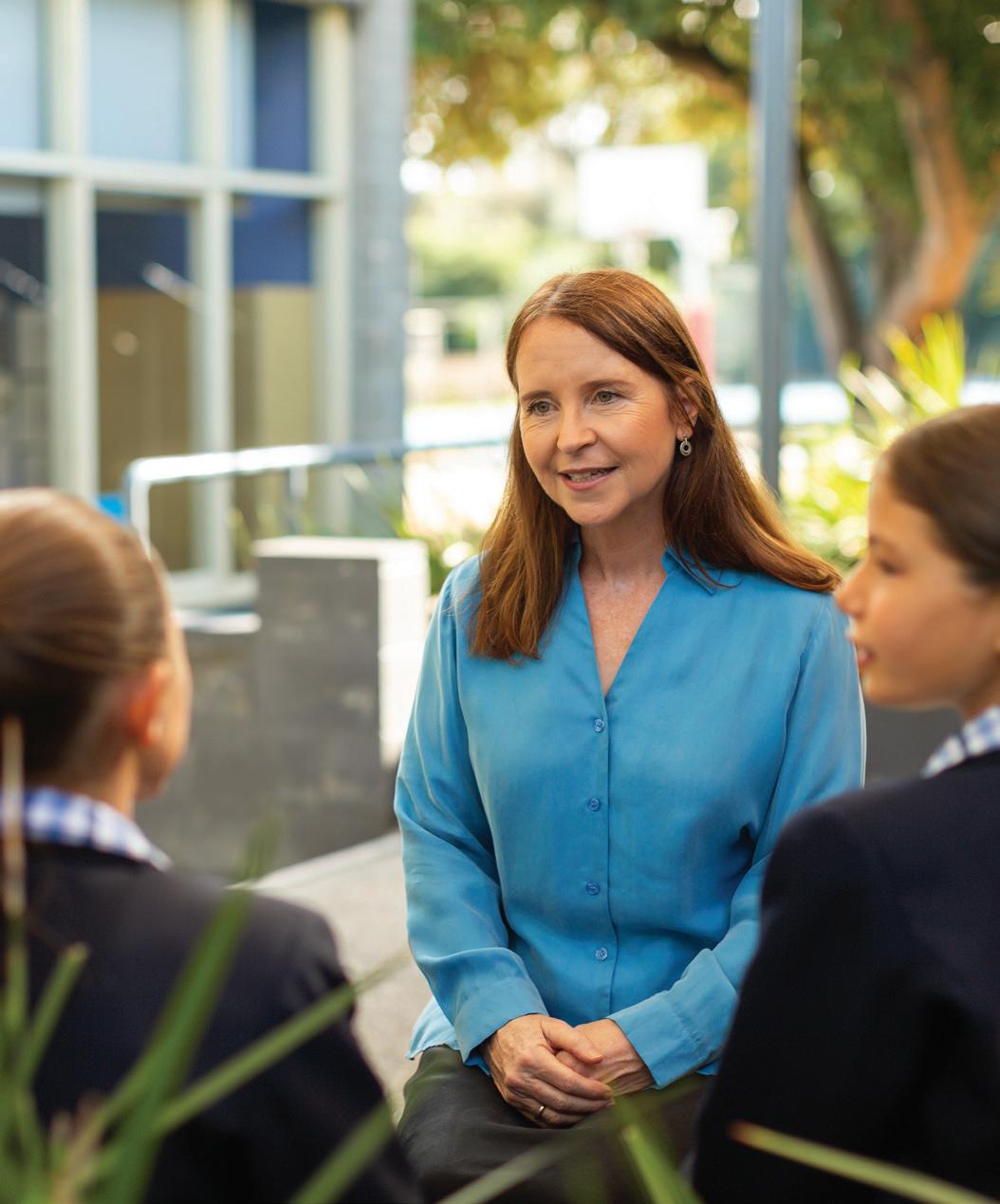
It is paramount that our students learn to harness their critical thinking skills to ask and clarify questions”

In today’s rapidly changing world, the pursuit of new skills is not just admirable –it’s essential. Mastering more than one language not only unlocks opportunities, but also enhances cognitive abilities and cultural understanding. Our ELC students are introduced to Mandarin at the beginning of their education, and the advantages are far greater than mere linguistic competence.
1
ENHANCES LITERARY SKILLS
According to the Department of Education, those who learn a second language develop a better understanding of the English language – they become more aware of grammar, sentence structure and conjugation. By learning a second language, students are able to reinforce, deepen and expand their English language skills. According to research by the University of Melbourne, bilingual students are more effective language learners as they have a better understanding of how language works. They are able to compare and contrast different language systems, which further enhances their ability to recognise words, refine pronunciation and grasp grammatical structures.
2
IMPROVES MEMORY AND BRAIN FUNCTION
Learning a second language strengthens the area of the brain that is responsible for memory, speech, and sensory perception. Those who are bilingual can retain and process information more easily and they can concentrate for longer.
3
EXPANDS ACADEMIC OPPORTUNITIES
Proficiency in a second language opens doors to a multitude of academic opportunities including international exchange programs, scholarships and specialised courses. Bilingualism enhances educational experiences and prepares students for success in an increasingly interconnected world.
4
FACILITATES CAREER DEVELOPMENT
In today’s competitive job market, bilingualism is a valuable asset sought after by employers worldwide. Proficiency in a second language broadens career prospects and enhances employability across various industries, offering a competitive edge.
5 INCREASES UNDERSTANDING OF OTHER CULTURES
Amid the rising tide of globalisation, proficiency in a second language also provides students with an understanding of different cultures, allowing them to experience diversity and inclusion from a young age. With weekly language classes, our ELC students develop an understanding of other cultures which fosters an environment of openness and acceptance.
6
HELPS DEVELOP CRITICAL THINKING AND PROBLEM-SOLVING SKILLS
Learning a language enables students to analyse information and solve problems more efficiently, as they can select relevant information and ignore irrelevant or misleading information. This skill not only benefits academic pursuits, but also translates into real-world problem-solving scenarios, empowering students to navigate complex challenges with clarity and precision. Learning a second language also fosters creative thinking, further strengthening students’ capacity to approach problems from multiple perspectives and devise innovative solutions.
In today’s interconnected world, young people are among the most active users of digital technology which, makes them prime targets for ever-evolving cyber threats. As young people increasingly rely on digital platforms for socialising, learning and entertainment, understanding cyber security becomes crucial for safeguarding their personal information and privacy.
Our newest corporate partnership with Tesserent Academy has been pivotal in the development of a comprehensive, rigorous and compulsory course for Year 10 students covering cyber security awareness training, risk management, threat landscape, and threat intelligence. By educating our students about cyber security, we equip them with the knowledge and skills necessary to protect themselves from online dangers such as phishing scams, identity theft, cyberbullying, and exposure to inappropriate content. By learning about concepts like password security, privacy settings, and safe online behaviour, young people can reduce their vulnerability to online exploitation and manipulation.
Our Year 10 program has also been essential in highlighting the opportunities for women seeking a career in cyber security, technology and related fields, as the demand for cyber security professionals continues to grow. The pathways for students across the cyber security landscape are interesting and diverse, from threat experts who focus on combating corporate espionage to Security Operation Centre managers who need to possess advanced communication and collaboration skills.
The rapid and continuous advancements in the areas of machine learning, artificial intelligence, and programming make it challenging for any one company or individual to stay abreast of the possibilities in these areas. Cyber security will continue to evolve to match the threats that come with these advancements. It is therefore essential that educational providers, such as schools, partner with experts to ensure knowledge is shared. At Toorak, we’re confident that the curriculum we’re delivering to our students will prepare them for the decisions they need to make and for the essential careers of tomorrow.
Teach your children about online safety, including the importance of privacy, avoiding suspicious links, and reporting any concerning online interactions
Keep all devices updated with the latest software patches and security updates to protect against known vulnerabilities.
Encourage the use of complex, unique passwords for each online account, and consider using a password manager such as 1Password for convenience and security
Activate parental controls on devices and internet services to limit access to inappropriate content.
Regularly review your family’s online activity, set guidelines for acceptable online behaviour, and establish open communication about any concerns or issues encountered online.
While these networks offer connectivity on the go, they also pose security risks. Hackers can exploit vulnerabilities in public wifi systems to intercept data or deploy malware on connected devices.

To me, academic growth means getting better at learning and understanding things. It’s like climbing a ladder, where each step is learning something new. I am proud of how I’ve persevered each day and pushed myself to do better in my academics each day, only comparing myself to who I was yesterday. During my time here at Toorak, I’ve tried my hardest in all my classes. Mathematics used to be my hardest subject as it never made sense to me in my head, but with the support and help of the wonderful teachers, I’m now excelling in that subject. I hope to continue growing and learning here at Toorak College.

Throughout the years, Toorak has presented me with diverse, challenging situations. I learnt these possibilities were intertwined with nurturing my growth and helping me flourish academically and also in other fields. From being selected as Jafar in the Year 6 production of Aladdin to being vigorously cheered at Speech Night when I was proudly awarded Academic Excellence, the school pushed me to continue to strive to achieve my best. These small, somewhat insignificant moments have aided me in growing academically and to thrive as a young individual.
ASSOCIATE PROFESSOR (SCHOOL OF CHEMISTRY)
THE UNIVERSITY OF MELBOURNE Collegian (TC ‘96)
I took a very long time to decide what career I wanted to pursue, mainly because I liked many of the subjects I took at school and then at university. It was a very broad selection, from chemistry through to gender politics and anthropology. I remember thinking from an early age that I wanted my career to be something that would make a difference in the world, but I had no idea how I could achieve that.
The decision to focus on chemistry as a career happened very suddenly after a third-year subject where I got to experience research work for the first time. I loved the creativity of research, the ability to find out things that no-one else in the world knew –it was like being an explorer. This mindset had a huge impact on me and I still tell my students today that it’s important to be creative and try crazy things as you just never know what might work. I continued my growth as a researcher through completing a Ph.D. and then running my own research team at the University of Melbourne. My area of research is how we can design drugs better through the use of smart containers. These containers can deliver drugs to target regions in the body and release them in a controlled way, thus improving the activity of many drugs and reducing side effects. I am passionate about the impact this research could have on the world – we have already seen the use of containers in COVID vaccines.
At many stages along the way I have felt like an impostor. Was someone going to work out that I didn’t deserve to be here, as I wasn’t smart or skilled enough? This feeling is something that is all too familiar for women and girls and I am sorry to say it doesn’t go away. Every time you take on more responsibility or step into a leadership role, it comes back with a vengeance. But I have learnt to love that feeling, as the scariest opportunities I have received – where I was sure I was going to be dragged out of the room at any moment – have also been the most rewarding and the best for my personal growth. So, I say take the leap and go for it.
My career has now come full circle, and looking back, I realise that the seemingly random subjects I studied at university, such as gender politics, were all incredibly relevant. I was asked about five years ago to take a leadership role in the university that focused on improving diversity and inclusion within higher education. While there has been a lot of progress in this area, there are still fewer women than men in higher levels of academia and this is similar for other groups such as LGBTQIA+ people, culturally and linguistically diverse communities, and communities with lived experience of disability. I have the role of developing programs to support greater access for these communities and improving visibility of diverse role models.

The reality is, we can’t ever know the impact we might have on other people and their achievements, especially when you have the privilege of talking to hundreds of young people each year like I do. One of the great things about being an academic is that I don’t have to decide how I am going to make a difference. I get to teach students, I get to do research, and I get to be involved in university management – and I put my all into all of that. Somewhere along the way I hope I am inspiring change.
I still tell my students today that it’s important to be creative and try crazy things as you just never know what might work.”
Born in 1889, Dr Vera Scantlebury began her academic journey as a student at Toorak College where she laid the foundation for her illustrious career. After completing her studies, she pursued medicine at the University of Melbourne graduating in 1914 with a Bachelor of Medicine and a Bachelor of Surgery. As one of the few women in her field during that era, it took until 1924 for her to be awarded the degree of Doctor of Medicine. Dr Scantlebury’s dedication and tenacity propelled her to become a pioneer in the medical profession, specialising in child health and welfare.
One of Dr Scantlebury’s most notable achievements was her pivotal role in addressing infant mortality rates in Australia. As the first female resident medical officer at the Melbourne Children’s Hospital, she spearheaded groundbreaking research and implemented innovative healthcare initiatives that significantly reduced infant mortality rates. In 1926 the government created a section of infant welfare in the Health Department and Dr Scantlebury was the first Director of Maternal, Infant and Pre-School Welfare in Victoria. Her tireless advocacy for child welfare and public health earned her widespread recognition and accolades and she was appointed as an OBE in 1938, cementing her status as a pioneering figure in the medical community.
In addition to her groundbreaking work in health care, Dr Scantlebury made a significant impact in the field of education. As a devoted Collegian she remained deeply engaged with the school, serving on the Collegians Committee and advocating for educational reforms that would empower future generations of students.
Beyond her professional achievements, Dr Scantlebury’s legacy is characterised by her unwavering advocacy for gender equality and social justice. Throughout her career she fought tirelessly to dismantle barriers and create opportunities for women in medicine and academia. The Vera Scantlebury Brown Child Welfare Memorial Trust Scholarship was created in 1946 to commemorate and continue her work as the Director of Maternal, Infant and Pre-School Welfare in Victoria from 1926 to 1946. The Scholarship is awarded to support the professional development of women working in the areas of maternal and child health and early childhood education. Dr Vera Scantlebury’s enduring legacy serves as a reminder of the transformative power of education and the profound impact that one individual can have on the world.
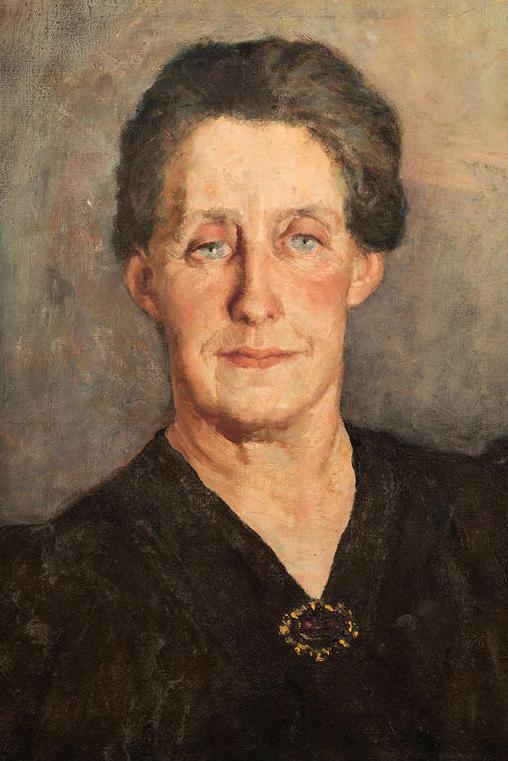
Dr Vera Scantlebury’s dedication and tenacity propelled her to become a pioneer in the medical profession, specialising in child health and welfare."
The very essence of human nature is that we are social beings. We take our cues on how to behave from the reactions and responses of others, we model behaviours exhibited by our family and peers, and we crave approval and love from those close to us. Being a part of a social network is what gives life its colour and meaning. However, with importance placed so highly on our social connection, it is important to understand when it can help and when it can hinder our sense of self-worth and self-belief. There is one of our social behaviours that walks this fine line every day: the act of social comparison.
Social comparison is a very important tool for development. It enables the growth of our physical, cognitive, emotional and social skills. Young children want to try to read like their older peers, they want to be able to play sport like their idols, and they want to play grown-ups like their parents. We develop through our ability to compare what we can do with what others can do, and that comparison sets the benchmark for what we want to try next.
In a school environment, where we are surrounded by many data points to measure ourselves against, we want students to see success in different subjects, sports and activities –this allows them to strive towards their own success and consider where their strengths may lie. It is a true strength of an ELC–Year 12 school that we have so many role models for study habits, behavioural standards and positive social interactions, and comparison is a very powerful tool for goal setting, motivation and belonging. However, with all this in mind, one of my commonly used expressions is “Comparison is the thief of joy.”
To successfully use comparison as a tool to motivate yourself, you must approach it with the right mindset. If you do not, this is what you will find: someone will always be smarter than you, someone will always win more awards than you, someone will always have more friends than you, someone will always have better holidays than you, someone will always earn more money than you, someone will always have faced less adversity than you, someone will always be happier, prettier, luckier and more successful than you.
If that is what you are looking to find, you will find it.
When my husband and I first became parents (15 years ago now … eeek), we quickly became overwhelmed with comparisons – some we made ourselves, and others were made for us. The baby fed too often, he looked for comfort too much, his teeth were slow in, he didn’t talk early enough, he shouldn’t sleep in the pram, we weren’t reading to him enough or in enough languages. We came up with a plan to deal with these constant comparisons. We would turn to each other and say, “Is this working for us? Are we happy with this?” If the answer was yes, we kept doing it. If the answer was no, we changed it. Although this is a very simple way to deal with comparison, I think it is a good starting point for evaluating your thinking process. If someone is getting better grades than you, are you happy with the work you are putting in? Yes? Good, keep going. No? Let’s change that then. If someone seems to be more well-liked than you, are you happy with the circle of friends you’ve got? Yes? Great, value them. No? Let’s work on that.
The truth is that comparison hurts when there is something inside you that you are dissatisfied with. This isn’t a bad thing –comparison may help you identify what you’re unhappy with and start working on what’s meaningful to you. A healthy way to use comparison is to compare yourself to the person you were yesterday and marvel at how, bit by bit, you are shaping yourself into the version of you that you are most proud of. Used this way, comparison can be the provider, rather than the thief, of joy.
A healthy way to use comparison is to compare yourself to the person you were yesterday and marvel at how bit by bit you are shaping yourself into the version of you that you are most proud of."
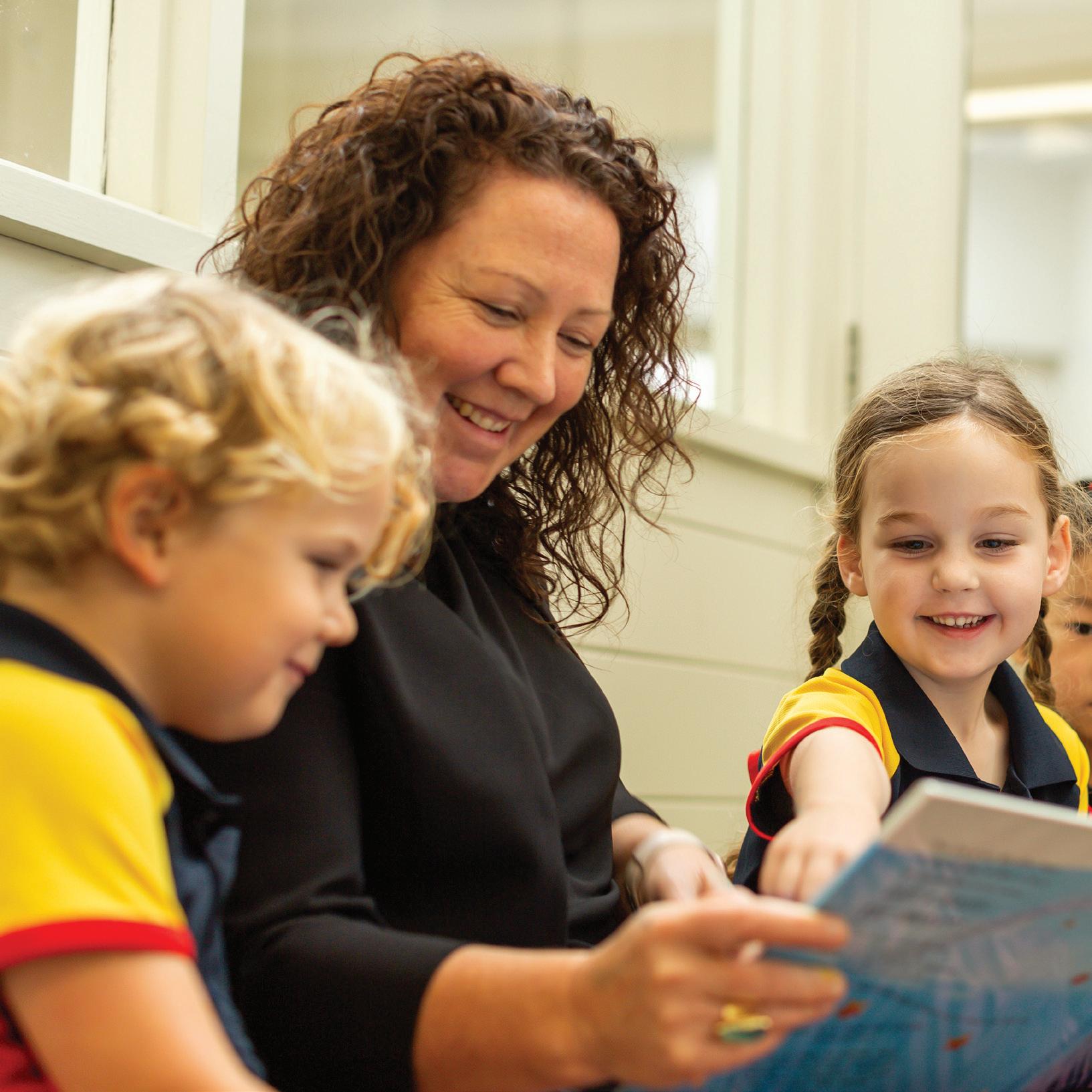
The amazing thing about working in education and with young children is that it is ever-evolving. Our work reflects developments in the latest research, in professional practice, and in the skills we as a society want to instil in the next generation. Currently, an important focus in education and our communities is our wellbeing – the health of our minds and bodies. We as adults know how mindfulness can positively impact our lives, but where do we start with young children?
As early childhood educators, we know that so much of what challenges a child is their developing brain – a brain that is navigating the social and emotional world around them, with problems, difficulties and unpredictability.
We know that the social and emotional development of a child’s brain is the key to unlocking and supporting the rest of their development. This is where learning about good habits, mindfulness and gratitude is extremely beneficial to children’s physical, emotional and cognitive development. In the Early Learning Centre (ELC), we embed these practices into our everyday program and curriculum.
Encouraging good habits and practices is important. Our ELC educators set up the classroom environments at the start of the day to provide a calm and positive transition. Establishing regular classroom routines assists children in consolidating their skills, independence, and confidence. During the day, educators work with children to take regular breaks for hydrating, eating healthy food, and knowing when their body and mind need rest.
Regular discussions about our emotions and feelings allows educators to support children with self-regulation but more importantly, with co-regulation. Working alongside children to assist them with working through emotions and feelings sets them up to have a growing awareness of their emotions and, more importantly, how to independently regulate their emotions. When a child is becoming frustrated with something, being able to give themselves time to refocus before taking the challenge again is an important part in learning emotional regulation.
Mindfulness practices are an integral part of our daily routines in the ELC. We actively engage in these practices and hold discussions with our students to cultivate awareness of their thoughts and emotions. Furthermore, we prioritise conversations with children about emotions and how they manifest physically, aiming to deepen their understanding of emotional intelligence and self-awareness.
Within our Health and Wellbeing lessons, children receive guidance and support centred on their physical wellbeing. They are encouraged to physically challenge themselves through yoga, relaxation exercises, and mindfulness techniques. By directly engaging in these practices, they develop important stress management skills and enhance their overall health and resilience.
Gratitude serves as a powerful catalyst for happiness – it nurtures our wellbeing, enhances the fabric of our relationships, and bolsters our physical health. Within our ELC environment, we embrace gratitude as a foundational principle, actively modelling, guiding, and nurturing its expression among our students. We cultivate a culture where gratitude is not just a sentiment but a lived experience woven into the very fabric of our interactions. Whether it’s a simple “thank you” exchanged between friends, acknowledging someone for their generosity or kindness, or recognising the importance of inclusivity and belonging within our community, we emphasise the interconnectedness of our actions and their impact on others. By instilling these values early on, we equip our students with the awareness and empathy to navigate the complexities of human relationships with compassion and grace.
As adults reflecting on memories and experiences throughout our own lives, rarely was the path as smooth as a golfing green complete with sunny skies and a mild breeze. The bumps in the road and the unexpected changes along the way helped us to develop the strength, resilience and resourcefulness to thrive in life. Judith Locke, Clinical Psychologist, advises us that, “Children need to learn how to face occasional emotional winds and storms to develop the confidence to step out their door every day, assured they can face both the good and the not-so-good things the world is going to bring them... when they face occasional headwinds... we do them no favours by always sheltering them from life’s weather.”
In order to develop resilience, which is the ability to cope with challenges, situations of discomfort, stumbling blocks and disappointment have to be faced. That includes both minor challenges, like not getting the colour cupcake you wanted or not sitting in the front seat when you thought it was your turn, as well as more significant disappointments such as missing out on the lead role in the school production or not making the A team in your desired sport.
We see evidence of our students learning to navigate feelings of disappointment, facing unfairness and overcoming difficulty as part of what makes a normal day.
The child who has nominated themselves for a leadership position time after time without being elected will understandably feel discouraged. The child who has not received an award for their endeavours, despite believing that they have tried their very best, will naturally feel disheartened. These are examples of situations where some things might not be fair and some things won’t go the way we had hoped. This is just how life goes — we will all have our victories and our setbacks.
The same can be seen in the course of a normal day or a normal week. Although we will experience positive days, most of the time our days consist of a mixture of achievements and misfortunes. There are days that are not so great and some that are just plain awful!
Summer in Prep understands the determination needed to achieve something difficult as she reflects, “I can’t do the monkey bars yet because I can’t reach them without help. Now I am trying to do a big jump to reach the first bar and then the next bar. If I keep trying until I am 8 years old, I think I will be able to do them all by myself.”
Summer’s resourcefulness, having the ability to cope with a challenge and the skills to pivot when things don’t go according to plan, is an example of our students navigating the difficult days in healthy ways.
Lily in Year 3 shares her experience of persistence through swimming, “I have been doing swim squad since last year and I thought I would really like to get into the District swimming competition. I had to work hard in training and I needed to learn tumble turns. I won a first place ribbon with my relay team. I learnt from all of the work I’ve done in training that I can do hard things.”
It is this grit, perseverance and passion for long-term goals that helps us to overcome obstacles and drives us to achieve. Our students also learn about zest, a dynamic character strength that is directly related to physical and psychological wellness with strong ties to overall life satisfaction and a life of engagement.
Nurturing these qualities within our students prepares them not only to tackle today’s trials but also to thrive in tomorrow’s. Just as a seed needs the right conditions to grow into a resilient tree, our children need the nurturing environment of challenge and support to blossom into resilient, resourceful, and zestful individuals capable of navigating life’s ever-changing landscapes with grace and confidence.
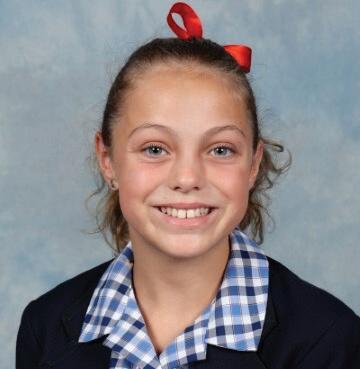
Personal growth is a journey that lasts a lifetime. Throughout my years at Toorak, I have grown in many ways and areas, but especially over the last two years with my swimming. Last year, I was asked to train with the senior swim team. Initially, I was excited but also nervous about swimming with the older girls. I worried that I wouldn’t be able to keep up. Through the encouragement of the swim coaches, I pushed myself to give it a go. I’ve now been training with the senior girls for over a year and I love swimming with them. It has challenged me to train harder and be more confident in my ability.

Being a new student in any school environment can be daunting and pose challenges but also provides an opportunity for personal growth. I started my Toorak College journey last year in Year 9 and have also been casually boarding during the week. While I was pushed outside my comfort zone from the very start by being away from my family at times, I have been fortunate enough to make new friends quickly, not just in my year level but across many year levels. Most memorable for me was participating in the Beyond Boundaries expeditions and the Community Service Project. Beyond Boundaries gave me an opportunity to make new connections with people and strengthen my friendships, all whilst being privileged enough to be able to travel to New Zealand.
What if there was a way to tackle global poverty, reduce inequality, accelerate climate action and promote peace, to improve the lives of everyone on the planet, all from a single investment?
There is, and she’s right in front of you: the adolescent girl.
Girls aged 10-19 are the most powerful catalysts for global change according to the UN. If every girl in the world’s developing countries was able to complete her education rather than dropping out of school, it would add billions to their countries’ economies, improve their countries’ climate resilience, and contribute to a more peaceful world.
This is what drives me: the idea that by empowering girls, we can create a better future for everyone. I have the joy of working as Deputy CEO at Plan International Australia, a global humanitarian organisation dedicated to children’s rights with a particular focus on girls. We’re the world’s largest organisation dedicated to girls’ equality; last year alone our work reached over 41 million people in 75 countries.
I have worked with countless people in power over the years. I’ve worked with world leaders to change laws and policies; with philanthropists to invest in solutions at scale; with businesses to drive sustainable impact. I spent six years working within the UN, and years before that in the media. But it’s the girls I work with around the world who are by far the most impressive, determined and visionary changemakers of all. What if we could shift more of the power into their hands, not only to help them realise their own rights, but also to improve the lives of everyone on the planet?
Through my work, I have seen some of the most heartbreaking sides of humanity. Children caught up in conflicts and crises, girls facing child marriage, exploitation or violence at a devastating scale and families forced to make impossible choices in the face of hunger or poverty.
I have also seen the best of humanity. It’s not in the job description but, in reality, my role is to hold onto hope in the face of all of that heartbreak and crisis and use it to inspire people to take action. I love the quote from Rebecca Solnit:

“Hope is not a lottery ticket you can sit on the sofa and clutch, feeling lucky. It is an axe you break down doors with.” My job is to break down doors.
For me, hope lives in the actions that countless people take every day to build a better world for children and girls. It lives in those who are resisting, surviving, building peace, spreading joy. The communities coming together to resist injustice. The humanitarians tirelessly giving everything. The advocates pushing for policy change. The girls who get up every day and go to school, building their future in spite of their present. Every action, every donation, every bridge built between different perspectives, every business working to do better, every news story shining light. No action alone is enough, but together, they are everything.
If you would like to support Plan International to educate and empower the world’s girls, through partnership or philanthropy, reach out to Hayley at hayley.cull@plan.org.au.
Girls aged 10-19 are the most powerful catalysts for global change, according to the UN.”
Freda Thompson, a name synonymous with courage, determination, and groundbreaking achievements, holds a special place in aviation history. A pioneering aviator and Toorak College Collegian, Freda made an extraordinary journey from the UK to Australia that marked a pivotal moment in the world of aviation and provided a platform for women in the field to launch from.
Born in 1906, Freda Mary Thompson had a passion for flight that was ignited at a young age, fuelled by a deep-seated fascination with the boundless possibilities of the skies. In fact, it was while she was at Toorak that she saw a small plane flying low over the houses and decided, “That was how I wanted to see the world –flying.” Nobody knew then just how high she would fly.
In April 1934, she set sail to England with plans to take part in the England to Australia Air Race. Once in England, she paid £1000 for a new De Havilland Moth Major with long-range fuel tanks, which she named ‘Christopher Robin’. However, Thompson was too late to enrol in the race and instead decided to make the journey on her own. With allowance for only one small bag

and a maximum flying range of 10 hours, Thompson departed from Lympne in Kent on 28 September 1934. The trip took 39 days, and on 6 November 1934 Freda landed in Darwin, making history as the first woman to fly solo from the UK to Australia. Thompson’s achievement was not without its challenges. From navigating treacherous weather conditions to overcoming mechanical setbacks, she encountered numerous obstacles along the way. However, her unwavering resolve and indomitable spirit carried her through, proving that with determination and perseverance, anything is possible.
Thompson’s historic flight was more than just a remarkable feat of courage and skill; it was a bold declaration of women’s capabilities in a male-dominated field. By defying expectations and pushing the boundaries of possibility, she shattered stereotypes and paved the way for future generations of women in aviation, proving that gender is no barrier to greatness. In 1947, she went on to become the first woman elected to the Royal Victorian Aero Club Committee and the following year, she was elected as its first female president.
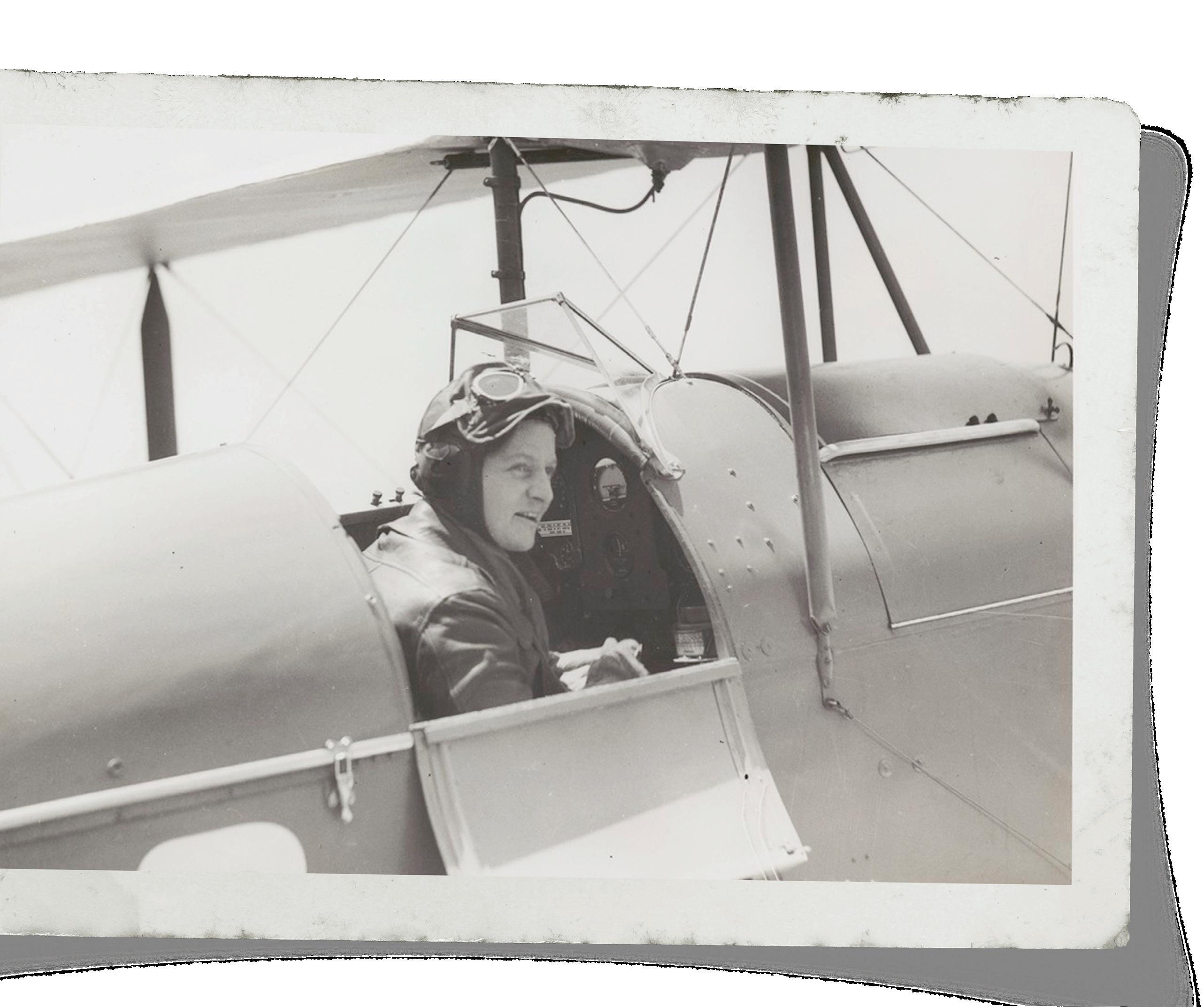
In 1950, she became a founding member of the Australian Women Pilots’ Association. In recognition of her extraordinary achievements she was awarded numerous honours and accolades, including the Order of the British Empire in 1972. In 2013 Freda Mary Thompson OBE was posthumously inducted into the Australian Aviation Hall of Fame.
Throughout her life, Thompson championed the rights and opportunities of women, using her platform to advocate for gender equality and social justice. She did not seek a career in aviation, but supported women who did – she argued that, for any pilot, solid nerve was more important than brute strength. Freda Thompson’s legacy as a pioneer in aviation will continue to inspire generations to come.
Thompson’s historic flight was more than just a remarkable feat of courage and skill; it was a bold declaration of women’s capabilities in a male-dominated field.”

It is well documented that women still face gender inequality across various facets of society. Despite much progress being made, entrenched gender stereotypes continue to influence our behaviour, expectations, aspirations and progress. These biases permeate social media and help to shape girls’ perceptions of themselves and of their potential; as a result, there is a huge space between what girls believe they can achieve and what they can actually achieve. This is known as the Dream Gap. By the time children are five, girls begin to see themselves as “less smart” than their male peers.
Toorak College is a progressive all-girls school that embraces the reality that girls are highly capable and can achieve in all areas of our society equally. It is our role as educators to empower our young women, to give them the foundations of strength and resilience in order for them to perceive themselves as successful, aspirational and confident individuals. In our inclusive, positive, open and inspiring all-girls environment, we have the luxury of always saying, “I can” – “I can do anything”, “I can fail and it is OK because failure is only an opportunity to further develop and learn”. We work towards breaking down the gender stereotypes, biases and traditional models of learnt behaviour that can limit girls’ belief in their own potential.
Our teaching and learning models ensure students are supported in questioning and analysing the world around them, encouraging them to be critical, creative thinkers and doers. We support students to develop the courage and strength to be themselves, because being themselves and believing in themselves is empowerment. This belief and confidence is also reflected in the ideas and conversations embedded within the artworks produced by our students. They are guided and nurtured to investigate their place within the world from a personal, honest and determined perspective, free of judgement or discrimination. Their artworks are full of potential and give clues as to where they have come from, where they are and where they are going.
It is crucial for the positive progress of our world for women to play a pivotal role in all areas, especially leadership. We need to challenge inequality in its various forms: the gender pay gap, healthcare and childcare models, government policies, and gender stereotypes, among others. By empowering our young women to be leaders, to be strong and courageous role models, we create an environment of change that can and must be at the forefront of our education system. Appointments such as gender equality campaigner Samantha Mostyn as Australia’s new GovernorGeneral go some way towards addressing the ongoing power imbalances, as Mostyn becomes yet another strong female Australian role model who inspires and leads others.
Closing the Dream Gap is about all this and more. For women to reach their full potential in a world that has been dominated by men, perhaps we need a new way of dreaming, a new way of living and seeing. But for now, we need to focus on belief. The belief that young women can be who they want to be, that some level of equality within our society is a reality and is crucial for progress, innovation and a better world for all.
We must endeavour to turn the conversation from “I can’t” to “I can”, to create a growth mindset in our classrooms, to encourage our girls to never give up and to empower those around them. These are things that we can do, that we do do, right here, right now, to ensure tomorrow is a space where all women can realise the dream of who they want to be and how they want the world to be. We are lucky to have a place like Toorak College, where the dreaming is real.
By the time children are five, girls begin to see themselves as less smart than their male peers. ”

In today's fast-paced digital age, where screens seem to dominate our attention and outdoor playtime dwindles, concerns about our physical and mental health are on the rise. But amid these worries, there's a beacon of hope: the transformative power of physical activity and sport. From improving cardiovascular health to boosting mood, the advantages of exercise are known to extend across all body systems. Perhaps less acknowledged, however, is the significant positive impact that engagement in physical activity and sport have on cognitive development.
Regular exercise and vigorous physical activity increase blood flow to the brain. This heightened circulation helps create new brain cells and releases chemicals such as dopamine and serotonin, which contribute to improved cognitive function and regulate our mood. The increase in oxygenated blood also strengthens the parts of the brain that control movement, making nerve signals travel faster. Additionally, it encourages the production of hormones that affect brain activity. All of these effects lead to better thinking and memory.
Engagement in sport enhances attentional control, the ability to focus on relevant information while ignoring distractions. Think of the netballer who’s focused on passing the ball to the shooter and is able to ignore the best efforts of their defender to execute the accurate throw. This heightened attentional control is crucial for various cognitive tasks from studying for exams, to learning how to drive or navigating complex social situations. People who regularly participate in sport show greater attentional control than their sedentary counterparts, leading to improved academic performance and professional success.
Physical activity is linked to enhancements in working memory, the cognitive system responsible for temporarily storing and manipulating information. Participating in sport requires individuals to constantly process and update relevant information such as the position of teammates, the trajectory of a ball, or the tactics of opponents. Athletes are required to recall plays or choreography under the pressure of competition, and to modify their movement according to changes in the environment. Examples of the working memory manipulating data are our aerobics squad dynamically moving through their routine and adapting to change when a team member is in the wrong position, and our basketball team modifying their offence when the opposition work out the play and start to anticipate our next move. Sport’s cognitive demand on working memory leads to improved cognitive flexibility and problem-solving abilities, essential in daily life and the academic program.
The benefits of physical activity extend to speech and language skills, essential components of effective communication and social interaction. Engaging in sport promotes the development of language skills including vocabulary acquisition, grammar proficiency, and verbal fluency. Due to the high-level requirement to work together, participation in team sports fosters social communication skills such as fairness, impulse control and emotional regulation, which are vital for successful interpersonal relationships. The team element of sport encourages collaboration, cooperation and empathy, further enhancing cognitive and social emotional development. This extends beyond teammates to teachers, coaches and umpires.

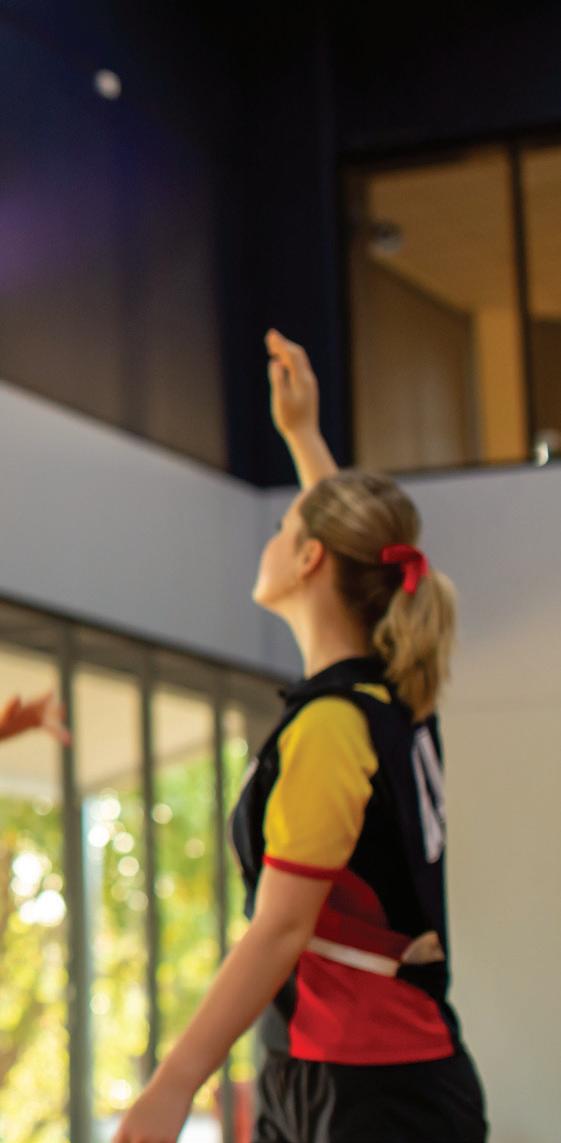

Physical activity is linked to enhancements in working memory, the cognitive system responsible for temporarily storing and manipulating information.”
Engagement in sport not only strengthens the body but also sharpens the mind. By promoting attentional control, enhancing working memory, and fostering communication skills, participation in a variety of sports and physical activities offers a holistic approach to cognitive enhancement. As we strive to optimise cognitive function in our children and young adults, integrating sporting activities into their routine emerges as a powerful strategy for unlocking their full potential, both on and off the field.

To me, empowerment is not just a school pillar; empowerment is being supportive of others and helping them learn and thrive. Being empowered is a symbol of positivity and success. Everyone should strive to be empowered or empower others to be the best version of themselves. I am empowered by friends and teachers and that is why I have come so far... I have flourished here at Toorak.

During my VCE journey and my time as a Deputy House Captain, I’ve been challenged with the overwhelming act of balancing all my commitments. At the beginning of the year, I quickly became worried about how I would dedicate enough time and effort into these commitments to result in a performance I would be proud of. Instead of resorting to reducing my load and making sacrifices in certain areas, my teachers empowered me to find ways of organising and prioritising that enabled me to give my best both in academics and the co-curricular aspects of school such as House. I have found managing my commitments in this way has helped to reduce my overall stress as well as instil a sense of capability and confidence that I take into everything I do. This is a skill I am constantly trying to grow and improve knowing it will not only help me with my endeavours within the school, but my future outside of Toorak in 2025.
At Toorak College, we encourage our students to pursue their passions both within and beyond the classroom, and we facilitate this with a rich array of co-curricular ensembles, teams, and clubs. Within our music centre, gym, and dance studios, there is a vibrant energy as students actively participate in learning while forging connections. These experiences not only nurture creative exploration and skill refinement, but also provide avenues for our students to rejuvenate their spirits through activities they’re passionate about.
Music ensembles offer a particularly valuable opportunity for developing active listening and collaboration skills. Have you ever watched a choir, orchestra or band, been struck by a sense of awe, and thought, 'How do they do that?' They are constantly listening and adjusting, being empathetic to the musicians around them and making split second decisions, creating art, breathing and moving in sync without saying a word. Taking part in music rehearsals fosters connections across year levels; our Year 7s sit alongside our Year 12s, all united in their passion for music. Traditions, concerts, and leadership opportunities are encouraged and celebrated, no matter the year or experience level. Making music isn’t just a thing you do – it’s a place where you belong.
Active participation in co-curricular teams, clubs and ensembles helps our students develop concentration and time management skills. You build, rehearse and train your brain to focus, which increases stamina and teaches you to keep trying in the face of adversity to work towards an united goal. In music, creating an ensemble performance is a process that takes time and commitment, requiring problem-solving and flexibility that are developed over many weeks and terms. Our musicians develop resilience through fully immersing themselves in the moment during a performance and then focusing equally on what went well and what the next steps are to progress their ensemble and performance skills. Responding to feedback and developing creative ways to bring the music to life with their friends also help to build resilience and trust.
There is nothing like a live performance – feeling that sense of anticipation beforehand, knowing that you’ve prepared as hard as you can, grounding yourself, and then surrendering to the process of the performance and experiencing the joy and relief that follow. The smiles on the students’ faces say it all, their positive outlook extending beyond performances and enriching their lives and classes alike.
Co-curricular involvement, whether it be through music, dance, drama, sports, or clubs, allows students to be bold in their choices and to revel in the challenge. Give it a go, find your passion, and develop lifelong skills and connections with like-minded friends.
Fosters skills in leadership, teamwork, communication, problem-solving, and time management.
Boosts confidence, self-esteem, and self-awareness, and helps students to discover new interests.
Promotes fitness and wellbeing through sports and activities.
Builds friendships, empathy, cooperation, and respect.
Deepens understanding of subjects through practical applications.
Provides relaxation, fosters creative expression, and prevents burnout.
Instils values like discipline, perseverance, sportsmanship, and resilience.
TOORAK COLLEGE
Collegians
THE DIRECTOR OF THE SMITHSONIAN'S NATIONAL PORTRAIT GALLERY Collegian (TC ‘83)

Born in Nigeria, raised in Australia and a citizen of the Netherlands, you are a true global citizen. How did your time at Toorak influence your pathway?
My career direction was decided at Toorak College when Mr. Brown told me I was about to fail chemistry. After successfully negotiating a passing grade on the promise that I would never again set foot in a chemistry lab, I studied art with Mrs. Taylor and loved it. I have fond memories of sitting in the dark looking at slides of famous works of art from around the World and wanting to see them in person.
What inspired you to take the path that led you to where you are today?
I grew up in an immigrant household where my parents, who had travelled widely and spoke several languages, discussed world affairs, and encouraged me to share my opinions. They also encouraged my creativity, which found an outlet in cooking and making art in a small ‘studio’ I set up in the back shed. I drew, painted, pressed flowers, and brought elaborate cakes into school for all my friends’ birthdays. To their credit, my parents never complained when I later turned our garage into a stained-glass studio! Toorak College also encouraged that creativity. I was on the debate team and in the drama club, and studied literature, history, and art.
With your doctorate in liberal studies, masters in art history and business administration, a bachelor’s in art history, and a graduate diploma in museum studies, do you attribute your success to your education?
Truthfully, I never saw myself as a scholar until about 10 years ago when I finally earned my doctorate. When I was at Toorak College I was a good student but, following my father’s footsteps, I tended to value real-life experience over studying. However, as I rose in the museum ranks, I began to realise that the genuinely great directors were those who could challenge curatorial ideas and assumptions based on a broad understanding of the humanities. I once watched my former mentor, the great Anne d’Harnoncourt, completely change the approach to an exhibition by asking a series of provocative questions that left the curator feeling they still had some work to do yet also feeling supported in their approach. I have always wanted to be a ‘curator’s director’ like Anne, who could push the envelope on content and earn the respect and admiration of her staff.
Nothing amazing happens without consistent practice, no matter how quickly we want to improve. ”
How do you stay relevant as a portrait gallery in a digital world while still embodying your philosophy of avoiding being outdated?
I believe that the more we rely on technology, the more we crave real-world experiences. While people certainly take selfies and use the audio guides in our galleries, they often put their phones away and enjoy having a unique experience either alone or with friends. I’ve written about the idea that people want to have transformational experiences with other people when they go to a museum. That means that we must provide spaces where everyone feels included, challenged, and inspired when they leave.
How do you think philanthropic donations can impact and help our school, and what can we teach our audience about the significance of philanthropy?
American cultural organisations are founded on the philosophy that when you become successful, you give back to the community who helped you along the way. As a result, non-profit leaders in the U.S. spend a great deal of their time reminding donors how to create social value. I have made friends with people who share a vision for the future and want to give their work, wealth, and wisdom to help the museum succeed. I think of it as ‘friend raising’, and love Muhammad Ali’s quote when he said, “Service to others is the rent you pay for your room here on earth.”
What do you see as your purpose in the world?
To advance the idea that history is now and what you do matters. Michelle Obama summed it up when she said, “The arts and humanities define who we are as a people. That is their power –to remind us of what we each have to offer, and what we all have in common. To help us understand our history and imagine our future. To give us hope in the moments of struggle and to bring us together when nothing else will.”
Mrs Dorothy Wardle is an illustrious figure of inspiration and tenacity who built the foundations of all-girls education at Toorak College. Her legacy echoes through the corridors, reflecting her profound influence on the educational landscape and on the many students who were empowered through her leadership. She was the first married woman to assume the role of Principal in 1943; her appointment thus marked a significant moment in the history of our school and reflected the progressive ethos she embodied.
Wardle’s roots were deeply embedded in Toorak, as she’d walked its halls as Dorothy Scantlebury from 1905 to 1911, and she had an infectious passion for the school that was obvious to all. She successfully rallied the entire community behind her visionary leadership and unwavering commitment to empowering girls to pursue their passions without limitations. Her advocacy for a holistic education, free from gender biases, laid the foundation for a transformative educational experience where girls could explore diverse subjects, from STEM to the arts, with confidence and enthusiasm. Under her stewardship, Toorak College evolved into more than an academic institution; it became a nurturing haven where young girls were encouraged to excel not only academically but also socially and emotionally.
Wardle’s influence extended far beyond the confines of Toorak College. She was a vocal proponent of the importance of all-girls education, recognising its unique capacity to cultivate leadership skills, foster camaraderie, and instil a sense of empowerment in young women. Through her writings, speeches, and educational initiatives, she became a beacon of inspiration, galvanising educators and policymakers alike to prioritise the needs of female students.
In the mid-1940s, Dorothy Wardle embarked on a visionary endeavour to establish a separate Kindergarten and Junior School within Toorak College, recognising the needs of the burgeoning local population. Through Wardle’s strategic leadership and with the support of the school’s council, her vision materialised with the opening of Wardle House in 1957, a testament to her dedication to providing exceptional educational opportunities for young girls.
Upon her retirement in 1958, Wardle left behind a legacy of growth, resilience, and collegial learning at Toorak College. Her impact reverberated through generations, shaping the landscape of all-girls education and inspiring countless young women to reach for the stars. Her pioneering spirit continues to guide educators and students alike, serving as a timeless beacon of inspiration and empowerment in the realm of education.
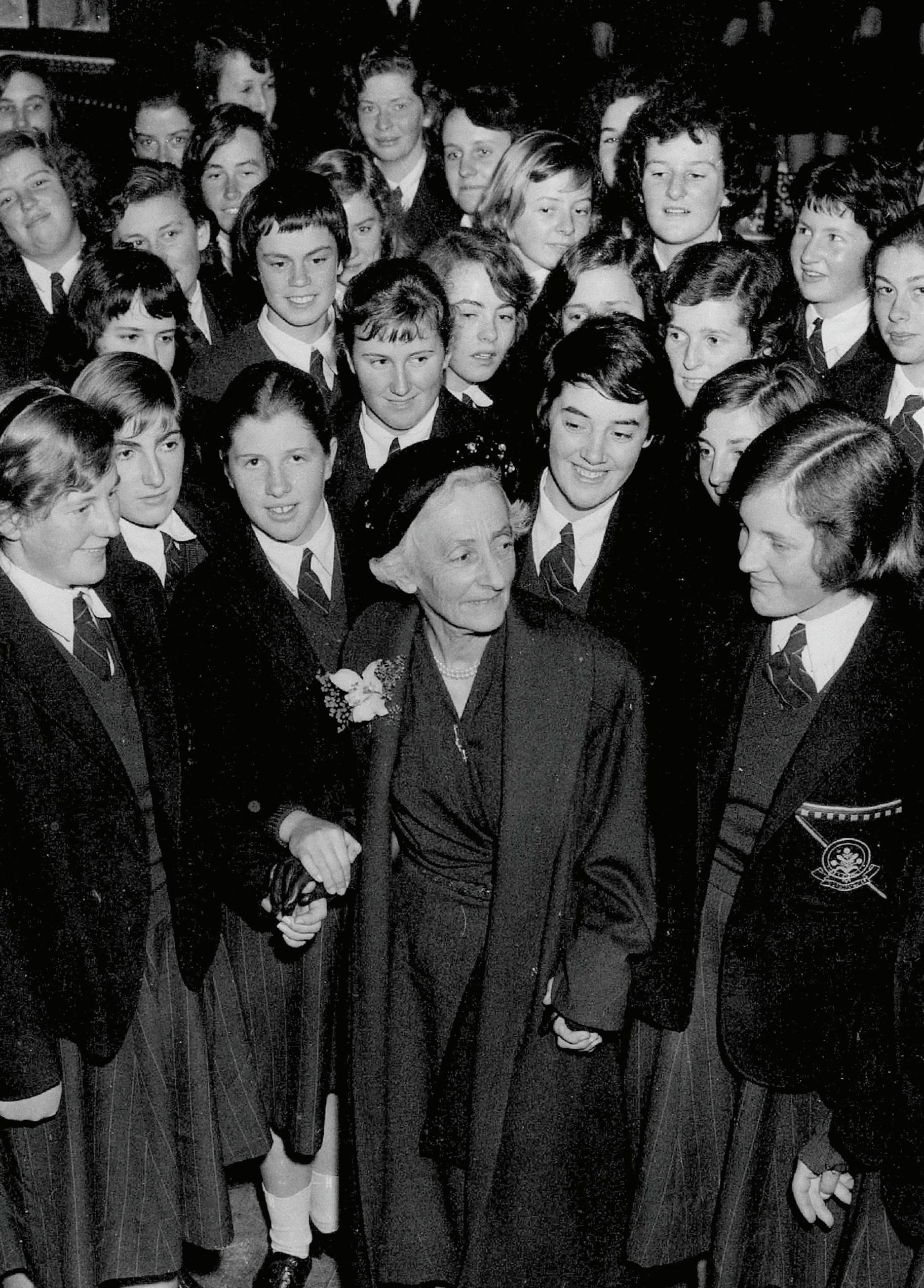
Her visionary leadership transformed Toorak College into a nurturing haven where young girls were empowered to pursue their passions without limitations.”

In our rapidly evolving modern world children need opportunities to develop deep and meaningful connections with nature. Fostering empathetic connections with the living world is the foundation of the Nature Play Program; it is as important to the child as it is to the natural world. Nurturing connections to the natural world sparks a child’s journey from an ego-centric view of the environment to understanding the interconnectedness between the human and more-than-human world.
Children’s entanglements with nature are vastly different from their engagement in the classroom. In the outdoors children are innately hands-on, touching, smelling, listening, seeing and feeling the environment that surrounds them. In nature children begin to wonder, to explore and to make connections between themselves and the natural world.
Nature play provides a multitude of benefits, fostering creativity and imagination through diverse stimuli and sensory experiences. Within nature, play is undirected, leading children to explore and make connections through natural materials such as sticks, sand, mud, rocks, grass and leaves. The environment and materials are forever changing, offering children a dynamic and changeable landscape to explore.
Environmental changes continually challenge children to reinvent their play, deepening their connections as they envision new ways to relate with place and with one another. These changes in the environment also command respect, contributing to building children’s understanding of the fragility of the natural world.
As children embrace their time in nature, openly exploring, uninterrupted by time constraints, unhurried in their discoveries, they are awakening to new perspectives about their place in the world. They are gently encouraged to value the life of the tiniest creature, to respect the habitats of the unseen minibeast and to marvel at the abundance of life surrounding them. Through their interactions children begin to embrace the flora and fauna and grow greater awareness of the sea, the sun, the moon and the power they hold in sustaining life in our delicate ecosystem.
Nature inspires children’s creativity offering open-ended opportunities to create, story make, construct, de-construct and test theories. Children innately embrace nature, threading the unending possibilities for play together into new schema; the process of making sense of the world around them. Nature play cultivates a sense of environmental stewardship, with children more likely to advocate for preservation and sustainability now and into their future.
“Some animals live under the sand, like crabs, so we need to keep the beach clean.”
“We need to look after the environment. We need to be helpful to the environment. We need to care for the animals in the sea.”
ISABEL “ Turtles and other animals might get stuck in rubbish and then they can not swim.”
FREDDIE“We don’t want the sea animals to have to find new homes.”
“I am going to go to the beach and pick up rubbish so it does not go into the ocean.”
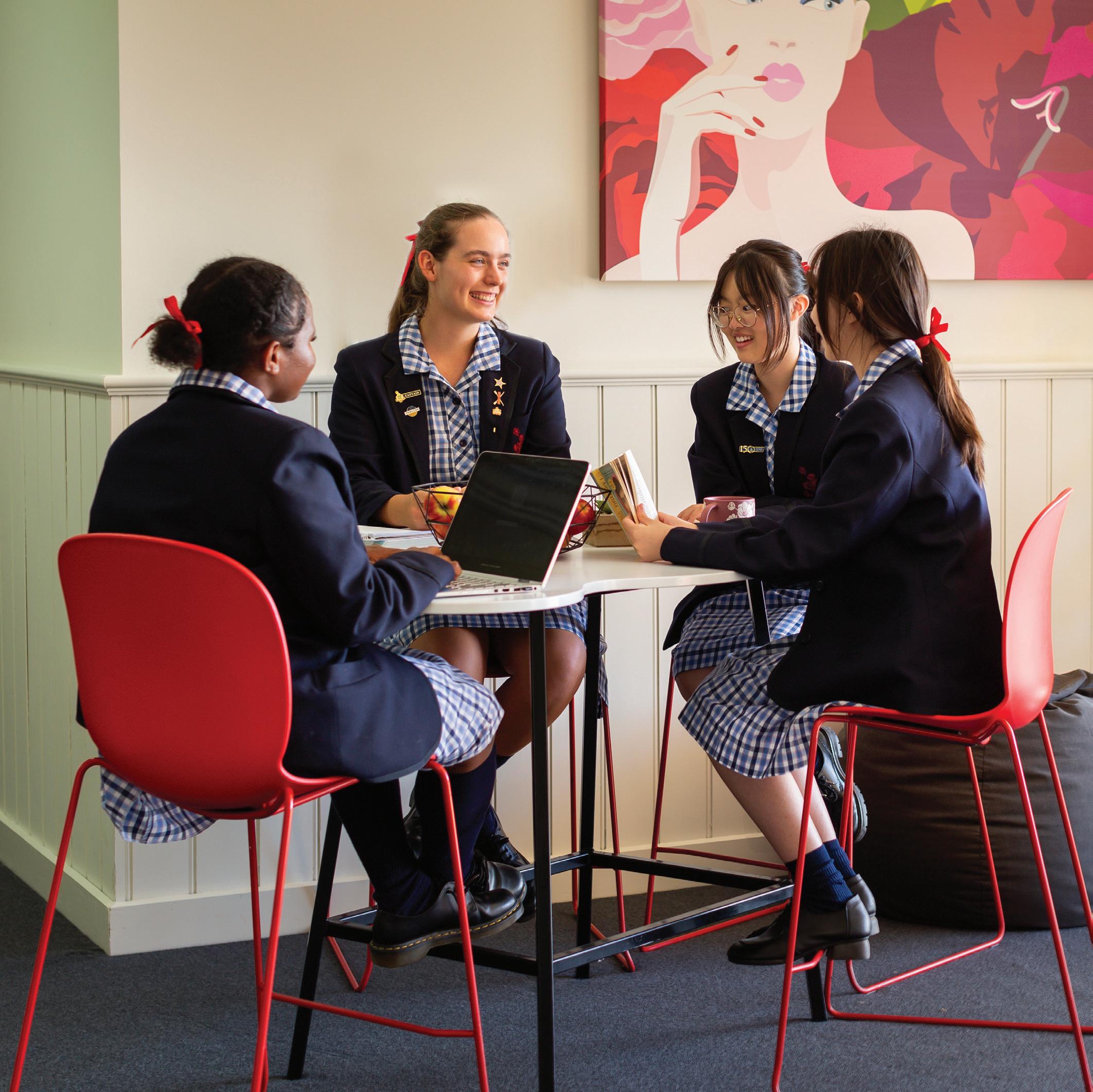
Living in a boarding community during adolescence not only teaches our students many life skills, but also fosters intercultural understanding. At Joan Ansett Hall, Toorak's Boarding House, students come from a range of diverse cultural backgrounds from all around the globe; the boarding house is a melting pot of traditions, languages, and perspectives. In this dynamic setting, our students not only navigate their academic journey but also undergo a profound experience of cultural exchange, gaining a deep understanding of those in the world around them.
One of the most striking aspects of life in Joan Ansett Hall is the daily interaction among students from various cultural backgrounds. Whether it’s during meal times, study sessions, or co-curricular activities, our students have ample opportunities to engage with peers from different countries and cultures, exploring their similarities and differences while learning to live alongside each other. These interactions transcend mere friendship, evolving into deep, meaningful connections built on mutual respect, curiosity, and a strong appreciation and understanding of each other’s differences.
Language acts as a bridge that connects individuals from diverse backgrounds. In the Boarding House, students often find themselves immersed in a multilingual environment where they learn phrases, idioms, and nuances of languages other than their own. This linguistic exchange not only enhances communication skills but also deepens understanding of cultural contexts and expressions.
Cultural celebrations and festivities provide occasions for students to share their customs and traditions with one another, while celebrating their own identities. Whether it’s Lunar New Year, Diwali, or Christmas, the Boarding House bursts with the vibrant colours and flavours of different cultures during these celebrations. Through participating in these events, our students gain insights into the rich tapestry of global traditions, developing empathy and appreciation for cultural diversity. Relationships are strengthened when a student gains a deeper understanding of their own identity through sharing it with others.
Living in Joan Ansett Hall also promotes an understanding and respect for differences in customs, habits, and beliefs. Our students learn to navigate cultural sensitivities and develop tolerance towards practices that differ from their own. This experience cultivates open-mindedness and empathy, essential qualities in an increasingly interconnected and globalised society. In Joan Ansett Hall, students truly become global citizens.
Joan Ansett Hall serves as a microcosm of global society, where cultural diversity is embraced and celebrated. Through daily interactions, linguistic exchanges, and cultural festivities, students develop a deep-seated appreciation for different cultures, developing intercultural understanding that extends far beyond the confines of the Boarding House walls and deep into the wider community.
The rich tapestry of experiences in a boarding community like Joan Ansett Hall includes:
In a multilingual environment, students learn and exchange languages, enhancing communication and cultural understanding.
Festivities like Lunar New Year and Diwali promote sharing of customs, deepening empathy and appreciation for global traditions.
Students learn tolerance and openmindedness towards diverse customs and beliefs, crucial in today’s interconnected world.
Joan Ansett Hall reflects global society, celebrating diversity and nurturing understanding beyond its walls.
There are many lessons that we must teach our young women today, but none are more important than values, attitudes and behaviours that centre around others’ needs and promote equity.
Engaging young women in philanthropy, such as fundraising and volunteering, shows them their potential impact on the world while fostering empathy and compassion toward others. Philanthropy opens their eyes to global inequalities and the lack of opportunities some people face due to circumstances beyond their control. It also instils a sense of responsibility, urging young women to take action when they have the ability to effect change.
When we reflect on the incredible achievements of women in our society, we can see how they leverage their strengths. Often, it’s a strong emotional connection that pushes them to act; they recognise need and look for ways to address it. They’re focussed on making a positive impact – improving the position of women in our communities and advancing gender equality, understanding the importance of lifting others up to make a long-term difference. They recognise the importance of investing in women and girls, knowing that when we invest in women, we invest in communities. They focus on improving education and building skills to help us find long-term, sustainable solutions.
By considering different perspectives and using a collaborative approach to problem-solving, we have the ability to make a significant impact not only on our community but also on the way that we work together. Recognising and embracing these strengths allows us to create an environment that incorporates more inclusive and collaborative decision-making. Relatedly, one of the most impactful philanthropic pursuits is mentoring. When women share their insight, expertise and challenges, and provide advice and strategies to other women, it boosts confidence and provides inspiration and motivation. This support and encouragement can change how a young woman sees herself and her future pathway.
When we consider how women have made, and continue to make, an invaluable impact on our community and on our society as a whole, we realise the importance of instilling a sense of philanthropy in our students so that they understand how their impact can be felt on a broader scale. As we create a culture of philanthropy and social justice, we empower young people to recognise need and to become agents of change in our community and beyond.
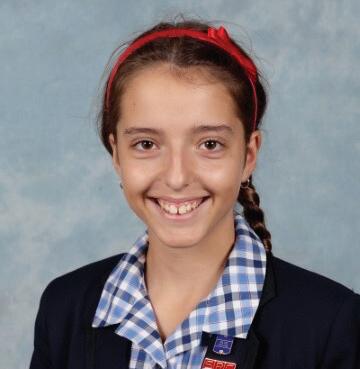
Toorak College is a wonderful school that allows all students to thrive in everything they do, whether that be academically or personally. The teachers always manage to make learning fun, so we remember what we learnt and we can further that knowledge, even if we found it challenging to begin with.
I loved writing stories when I came to Toorak, but my writing wasn’t as good as it could have been. I have since learnt to enjoy the process and take my time. I even entered a story writing competition and came runner-up. Toorak allows everyone to thrive in their chosen passion by providing students with the tools which enable everyone to shine in their own way.
 SOPHIA JACKSON KENNY
SOPHIA JACKSON KENNY
At Toorak, the school offers a broad spectrum of opportunities and support where needed and I have flourished in various domains including sports and music. Before I came to Toorak, my involvement in sports was minimal and I only played one instrument. However, since enrolling, I am participating in many sports, including running, soccer and tennis, and have expanded my musical repertoire to three instruments: double bass, piano and singing. All of these instruments were difficult to start, but with the support and guidance the music teachers gave me, they became enjoyable and less difficult than before. Overall, Toorak has provided me and many others with a great environment, and I look forward to future opportunities.
When I was in Year 10 at Toorak College we were given a careers project involving the selection of three potential professions. Mine were very eclectic: guide dog trainer, marine biologist, and lawyer. Clearly I had no clue what I wanted to be!
By the time I finished school, I had done an exchange in South Africa and wanted to be a diplomat. I was told a law degree would open doors to this and other careers, so I enrolled in a combined law/arts degree. I found the study of law very tedious and swore I would never become a lawyer. Unfortunately, my disinterest meant that I didn’t achieve the marks required to join the diplomatic service. My career ambitions were already in tatters! I begrudgingly decided to complete my legal qualifications by doing my ‘articles’, a kind of apprenticeship, at a law firm. As it turned out, I discovered a legal practice specialty that really suited my skills and interests – commercial law. It involved negotiating and writing contracts and sitting across the table from businessmen (and the occasional woman) learning about their business. My 20-something self would have been very surprised to hear that I ended up becoming a partner in a major law firm and practising law for over two decades!
Eventually my legal career led me to discover my passion for aviation when I became General Counsel and Company Secretary of Virgin Australia. By this stage, I was more interested in business than law, so when I was given the opportunity to lead a business function at the airline, I jumped at it. From there I went on to hold various airline CEO roles, including with Virgin Australia Regional Airlines and Tigerair Australia.
Ultimately the opportunity of a lifetime presented itself – to start up a brand-new airline from scratch in Canada. Our four daughters were grown up and independent, so my partner and I packed up our belongings and headed to Canada in June 2021. It was a challenging time, right in the middle of the pandemic, but we managed to successfully launch Lynx Air in April 2022.
The biggest challenge I faced throughout my career was undoubtedly sexism. I worked in male-dominated industries and had to battle hard to overcome the inherent bias that acts as a barrier to career progression for women and minority groups. At Toorak we were encouraged to pursue our dreams and to aim high; there was never any suggestion that our gender would get in the way. The values and beliefs instilled in me at Toorak gave me the courage and determination to challenge and overcome those gender-based barriers, and this in turn has enabled me to enjoy a rewarding and exciting career journey.
My advice to students at Toorak is not to worry about mapping out a long-term career path – keep an open mind and be ready to grab the opportunities as they present themselves. This requires a willingness to take risks and to be prepared for failures and disappointments along the way. I firmly believe my career was more defined by my failures than my successes – the rejection letter from the diplomatic service was just the beginning! To quote CS Lewis, “Failures are finger posts on the road to achievement.”

I firmly believe my career was more defined by my failures than my successes.”
1896 — 1988
COLLEGIAN (TC 1913)
In the archives of music history, there are few melodies as iconic and instantly recognisable as “Kookaburra Sits in the Old Gum Tree”. This beloved Australian tune, synonymous with childhood memories and national pride, was penned by none other than Marion Sinclair, a remarkable composer and Toorak College Collegian.
Born in Melbourne in 1896, Marion Sinclair possessed musical talents that were evident from a young age. It was during her time as a boarder at Toorak that her passion for music blossomed, laying the foundation for her future as an iconic musician and composer. After returning to the school as a music teacher in the 1920s, Sinclair composed her magnum opus, “Kookaburra Sits in the Old Gum Tree”, on a Sunday morning in 1932 after she had an inspiration in church and dashed home to write down the words.
In 1934, she entered the song into a competition held by the Girl Guides Association of Victoria. Little did she know that this whimsical melody, inspired by Australia’s native wildlife, would capture the hearts of millions and become an enduring symbol of Australian identity. With its catchy tune and playful lyrics, “Kookaburra” quickly became a beloved folk song, cherished by Australians of all ages.
Beyond her iconic composition, Sinclair’s contributions to the world of music were vast and varied. As a composer, she penned numerous songs and choral pieces that celebrated Australia’s natural beauty and cultural heritage. Her music, characterised by its melodic richness and evocative storytelling, earned her widespread acclaim and cemented her status as a leading figure in Australian music history.
In addition to her musical endeavours, Sinclair was a trailblazer who broke down barriers and paved the way for future generations of women in the arts. At a time when opportunities for female composers were limited, Sinclair defied societal norms and pursued her passion with unwavering determination.
Sinclair’s impact extended far beyond the realm of music, as she played an active role in promoting cultural exchange and understanding through the arts. As a staunch advocate for music education, she believed in the transformative power of music to bridge divides and foster empathy among people of diverse backgrounds. Her dedication to promoting the arts as a force for positive change has left an indelible legacy on the Australian cultural landscape and serves as a testament to the enduring power of creativity and expression.

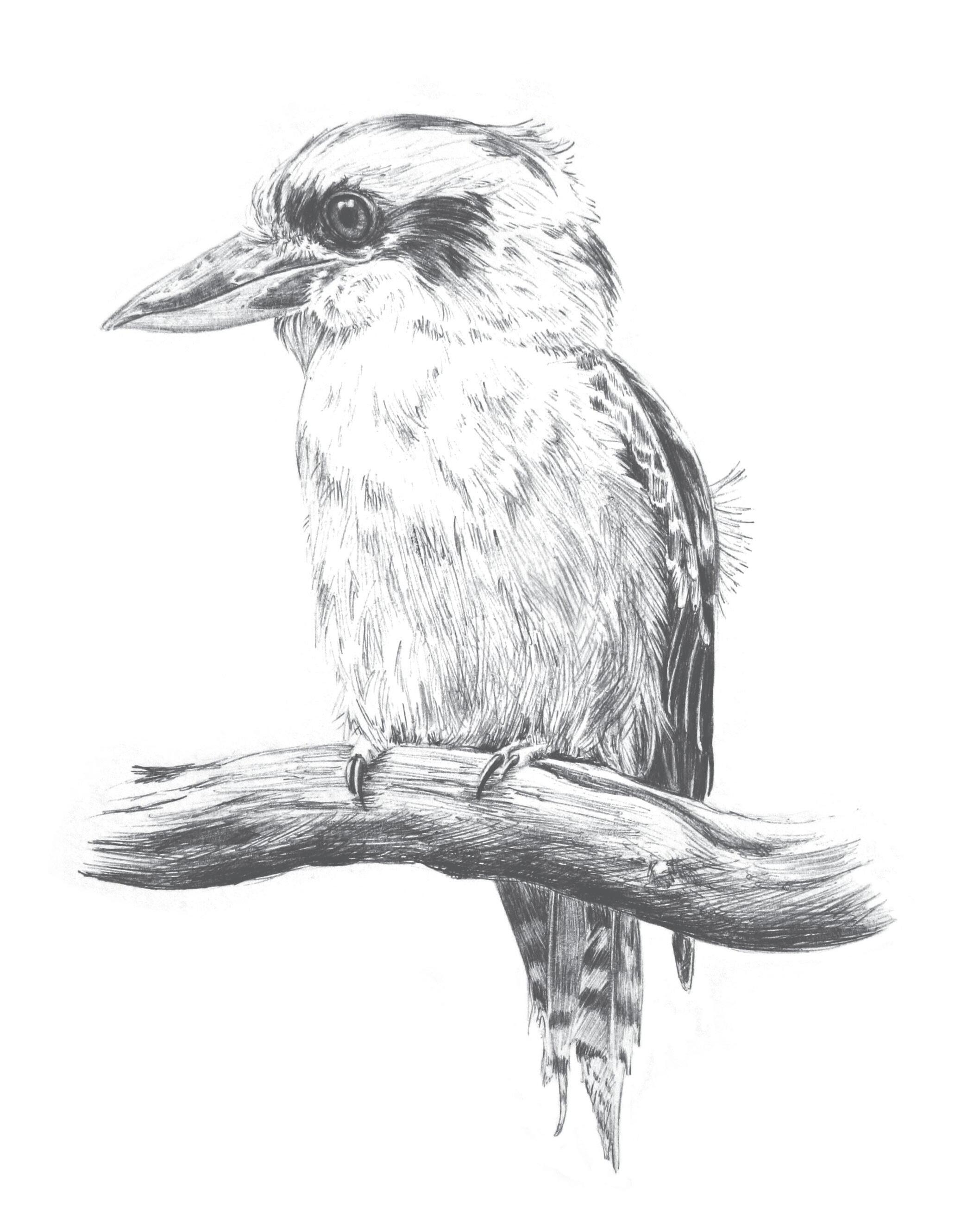

OLORE PLIGENTE CONE LA CONSEQU IBUSAERIBUS DTEM
PHILANTHROPIC SUPPORT REMAINS ESSENTIAL TO OUR SUCCESS. WE CALL ON OUR COMMUNITY TO SHOW THEIR SUPPORT FOR TOORAK COLLEGE IN A PRACTICAL WAY THROUGH GIFTS AND DONATIONS.
By Name Surname Head of Junior SchoolParuptum harchil ipid qui utectotature conem illuptatiat as re nosto quiatisquo quatese ditatur? Uga. Nequi dolutem quis eum si idebitae cupta qui in reniento te explam eicabo. Pudipis cus quia comnime nonseque pelitatur, omniandit faccus voluptatiae con cusaper itatem videri a quodiste perferr uptate ped quam sed exernam sum, cus, ipsaperatio. Iciet doluptaquid moloritempos eos as voluptibusda sit maximpos voloresed ma et quid que vel int que videsen disque et la quis quaeruptatis ati net dolo quo et volorendit es aut reriam earumquam aut fugia qui consequo mi, officab is et aute etur a voluptatio.
Tis ipsandi veliquos aut optior sundia doloren dellend aecaeseque volesci
START A CONVERSATION
doluptation cust voloruptas nossit vollabo. Et alit im ut esed quaero quunt unt vent ut hil eium que post, officil is excerum vollese quibus audit ium verumqui con nonsequi blautem fugitem fugitius eos.
Learn more by scanning the QR Code or by contacting the Development Office on (03) 9788 7315 or email giving@toorakc.vic.edu.au.
doluptatet officab oreium ad qui nos non cum nescimet acerist, ius, te cus pro volorpor as dolupti nullaboribus intem quiam ilita sa estem remperum fugit omnim voluptam, iustiscienit inullor ehenis dolecum a dolestintur, et optatumquis experibus sima dolupidus destibearcia serchil liquibus expero comnist, odis sim inctatet labore, quam, totate natas eosam verfero. Ivolorecatem endi dit ullit am net ratque volument laccatus sit et la estis que volorru ptatius soluptas remquae placcaborae con recatus ea vid molut et ex eruntem etum ut fuga. Itati vendunt laci corem harum sit unt harchil id quas dolorem olorum natur, aborpor eperfere, occatur?
Nat dolorat emporiat enis iumquam enditis id quisitibus molupta sserem excere nulpa volupis et lacera sitatium quia et faccati
Tis ipsandi veliquos aut optior sundia doloren dellend aecaeseque volesci doluptatet officab oreium ad qui nos non cum nescimet acerist, ius, te cus pro volorpor as dolupti nullaboribus intem quiam ilita sa estem remperum fugit omnim voluptam, iustiscienit inullor ehenis dolecum a dolestintur, et optatumquis experibus sima dolupidus destibearcia serchil liquibus expero comnist, odis sim inctatet labore, quam, totate natas eosam verfero.
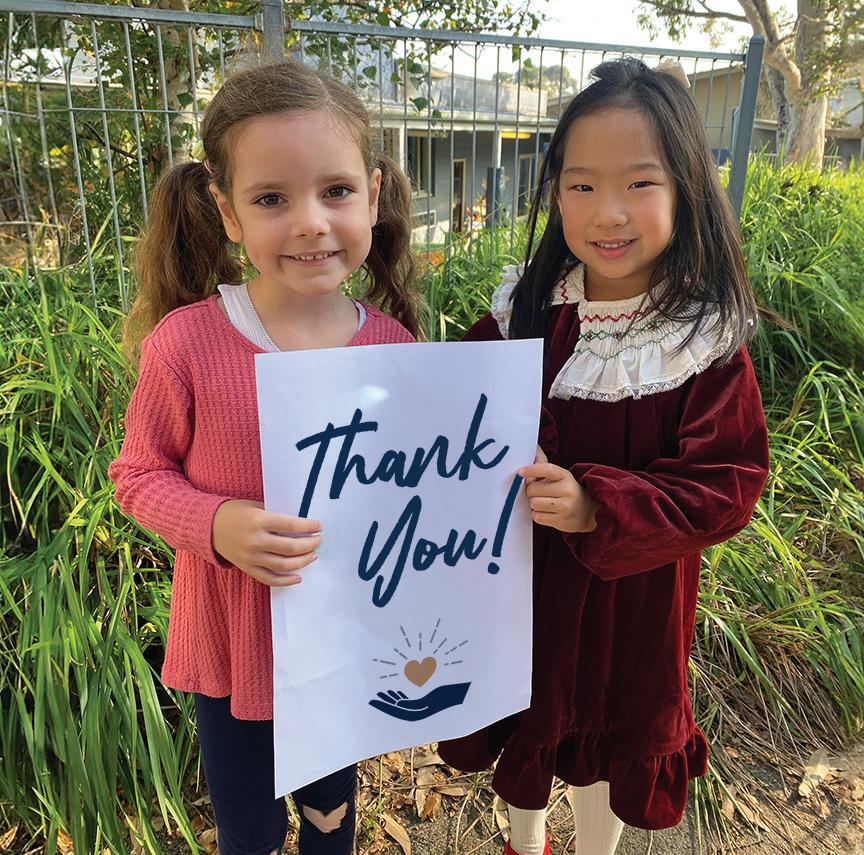
ANNUAL GIVING DAY
AMOUNT RAISED — $72,536
We are so grateful for the support that we received on our Annual Giving Day. The generosity of our community has seen us raise $72,536. These funds will directly contribute to enhancing our environment to ensure greater flexibility, accessibility and inspiration for all. Thank you to all of those who donated on the day, and to those who contribute in many other ways to enhance our school every day.
Immerse yourself in a world of creativity and culture as we unveil the Toorak College Community and Arts Precinct. This cutting-edge facility is poised to become the beating heart of our campus, fostering a vibrant atmosphere where talent flourishes and artistic expression knows no bounds. Join us for the grand opening in September, where we'll come together to celebrate the culmination of hard work, and a shared vision for the future. Don't miss this opportunity to be part of history in the making!

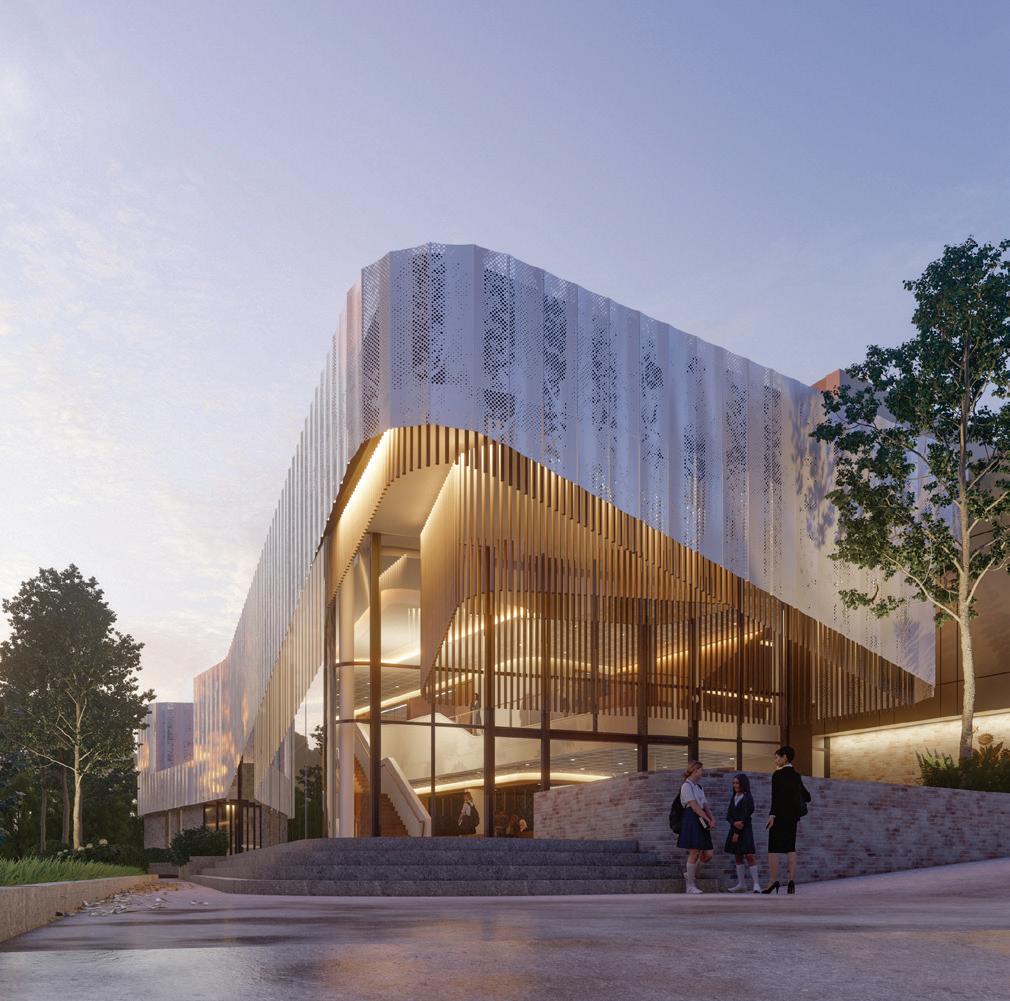
TAKE YOUR SEAT
SECURE YOUR LEGACY
We invite you to join us in commemorating our new Community and Arts Precinct by dedicating a seat in our theatre. Your contribution to our future will be recognised with an engraved plaque on the back of your selected seat. With limited seats available, secure yours today by scanning the QR code.
GRADUATING CLASS OF ‘23
SPEECH NIGHT
TC CONNECT
15O TH ANNIVERSARY GALA BALL
BATTLE OF THE BANDS
INTERNATIONAL WOMEN’S DAY LUNCH
HOUSE ATHLETICS
AUTUMN CONCERT
YEAR 11 FORMAL
SUMMER FESTIVAL
EASTER BONNET PARADE
15O TH ANNIVERSARY EVENT SCHEDULE
Last year, the Toorak College 2023 Year 12 cohort celebrated some remarkable ATAR results with 22% achieving ATARs over 95 and 35% with ATARs over 90. There were 43 early offers to students from 7 different universities and 3 students received cadetships with our industry partners. We are delighted to congratulate the 2023 Dux, Maria Suetin on achieving an ATAR of 99.45 and our Dux Proximus, Youyou Zhu on achieving an ATAR of 99.3.
Congratulations to our 2023 Year 12 cohort on such outstanding achievements.
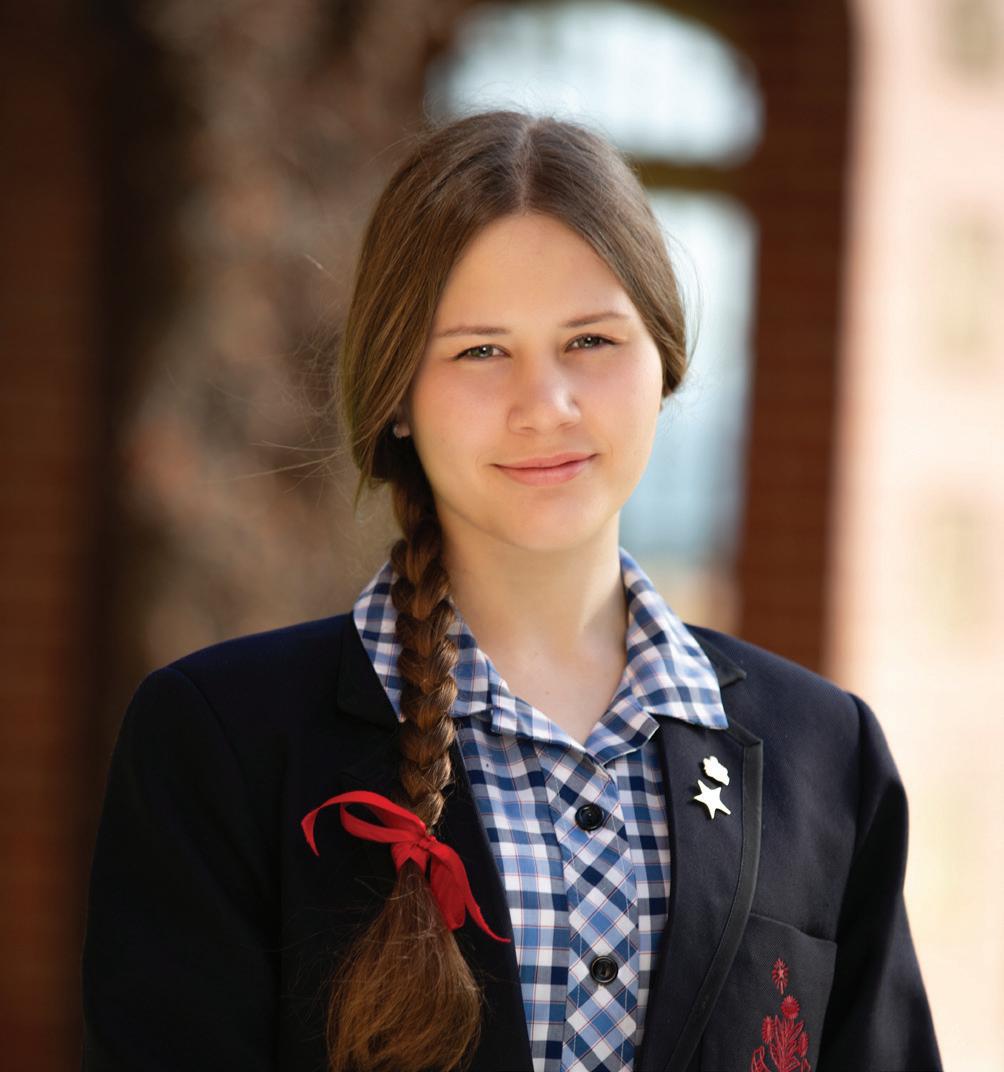
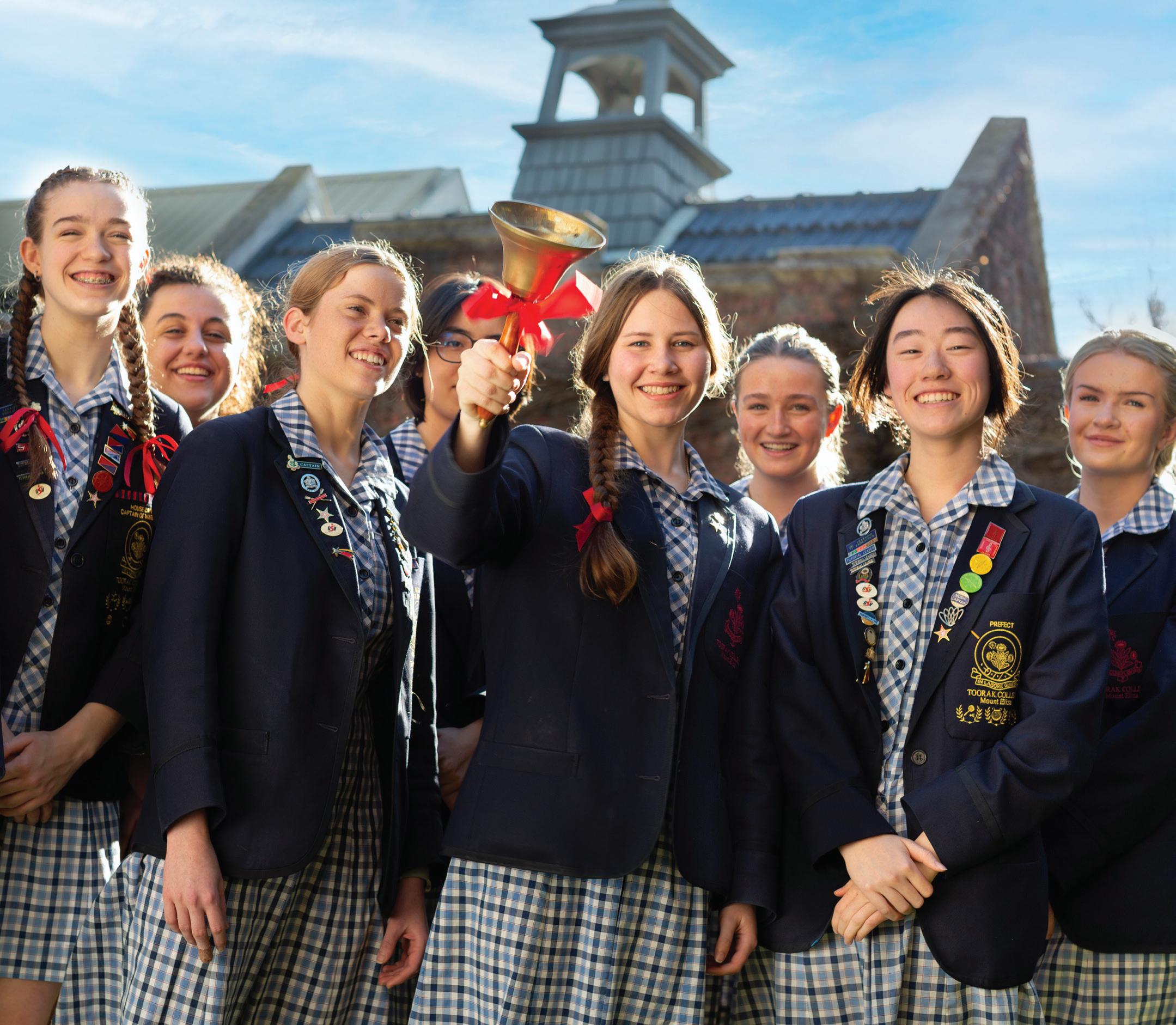
Our School celebrated our Annual Speech Night at Robert Blackwood Hall. It was a wonderful evening recognising the hard work and achievements of students throughout the year. This year’s theme ‘Be the Change’ focused on the ways in which each of our students works towards being the best version of themselves, while considering the ways they can contribute to the bigger picture. For our graduating class, it was about considering what they are passionate about and deciding what they want to contribute to outside the gates of Toorak College.
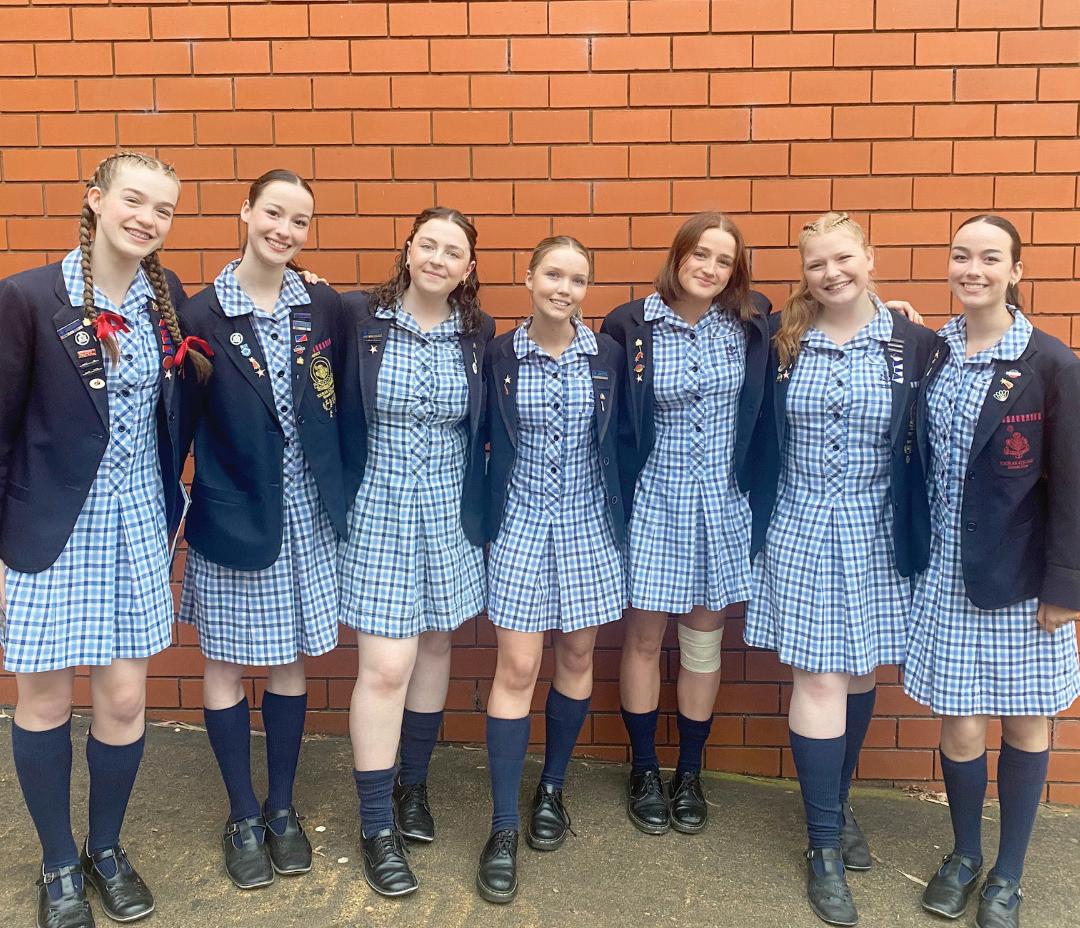



Before the Easter Break, our Year 9 students celebrated TC Connect after weeks of planning and organising! Students were split into departments such as Executives, Marketing and Creative teams to deliver a fun-filled event for Year 6 and 7 students. Annabel from the Marketing team reflected on her experience - “Over the past few weeks, our Year 9 cohort has been working really hard to put together this year’s TC connect. Preparing for the day definitely set us some challenges, however, it gave us a taste of how to deal with things we hadn’t before, like budgets, tight timelines and placing orders.ˮ

The night was filled with celebration and heartfelt nostalgia as we commemorated 150 remarkable years of empowering and educating students.
Thank you to everyone who attended and to the wonderful performances from Amalia Foy (TC '19), MC Jacinta Parsons, the Baker Boys and the Australian Youth Band.


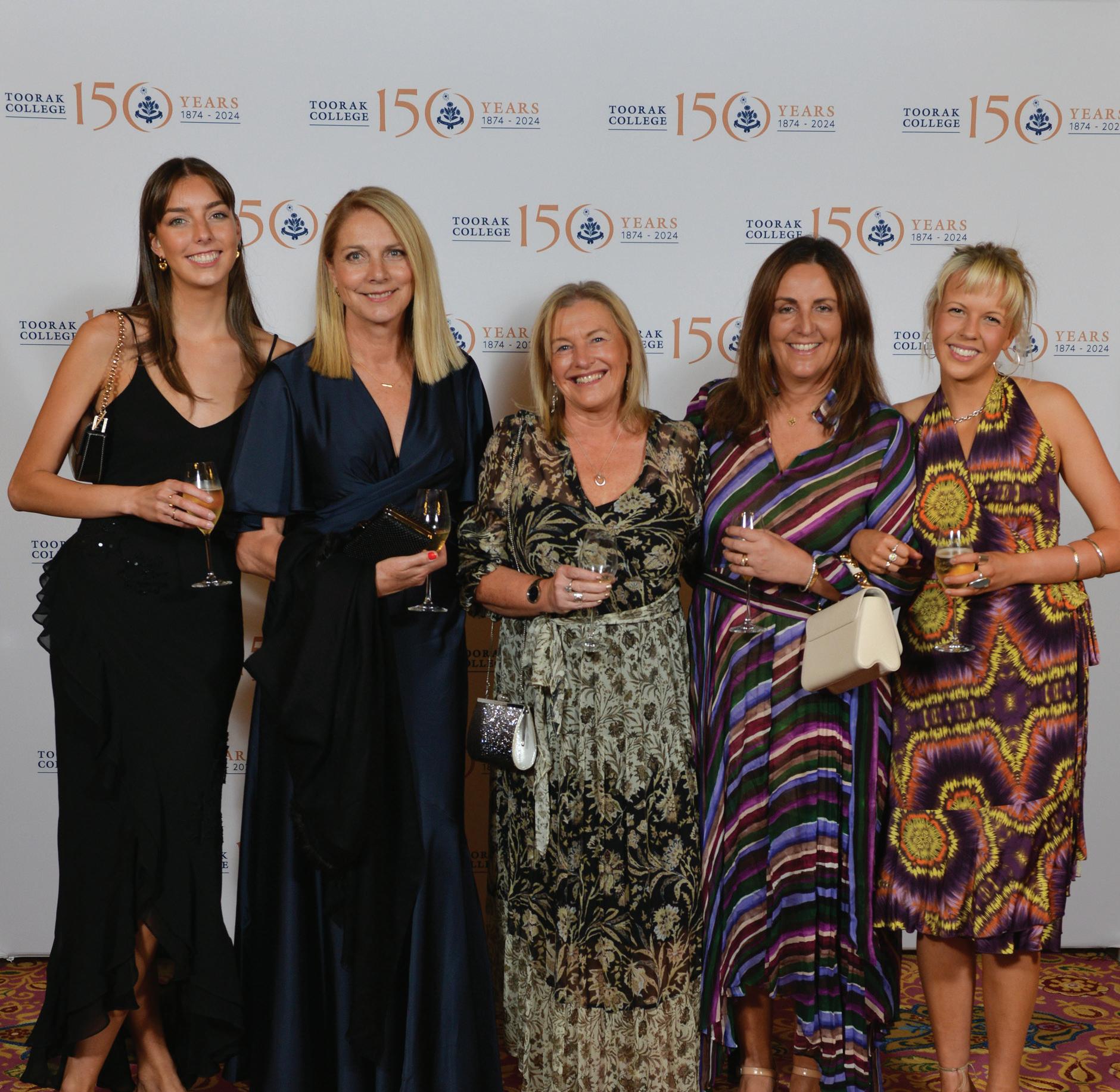


This year, students celebrated International Women’s Day dressed in a splash of purple, participating in various activities from Zumba to sports, creating an atmosphere full of fun and excitement.
Separately, during the Battle of the Bands, we were very proud of 'Ducktape,' who won the judges' vote with their performance of 'Sk8er Boi.' 'Duggys 4' won the popular vote with their 'Rolling in the Deep' medley.

Honouring this year’s International Women’s Day Theme, “Count Her In: Accelerating Gender Equality Through Economic Empowerment,” Toorak College teamed up with NAB to host a corporate partnerships luncheon. We were privileged to hear insights from esteemed speakers, including Tandadzo (Tando) Matanda (TC '05), Director of Zambezi Investments, Natalie Irvine, Head of Private Wealth from NAB, and Hayley Cull (TC '83), Deputy CEO of Plan International. It was a truly inspiring event, celebrating the importance of a collective commitment to empower underrepresented groups in the finance sector and recommitting ourselves to nurturing the leaders of tomorrow. Let’s continue breaking down barriers and empowering our future professionals.
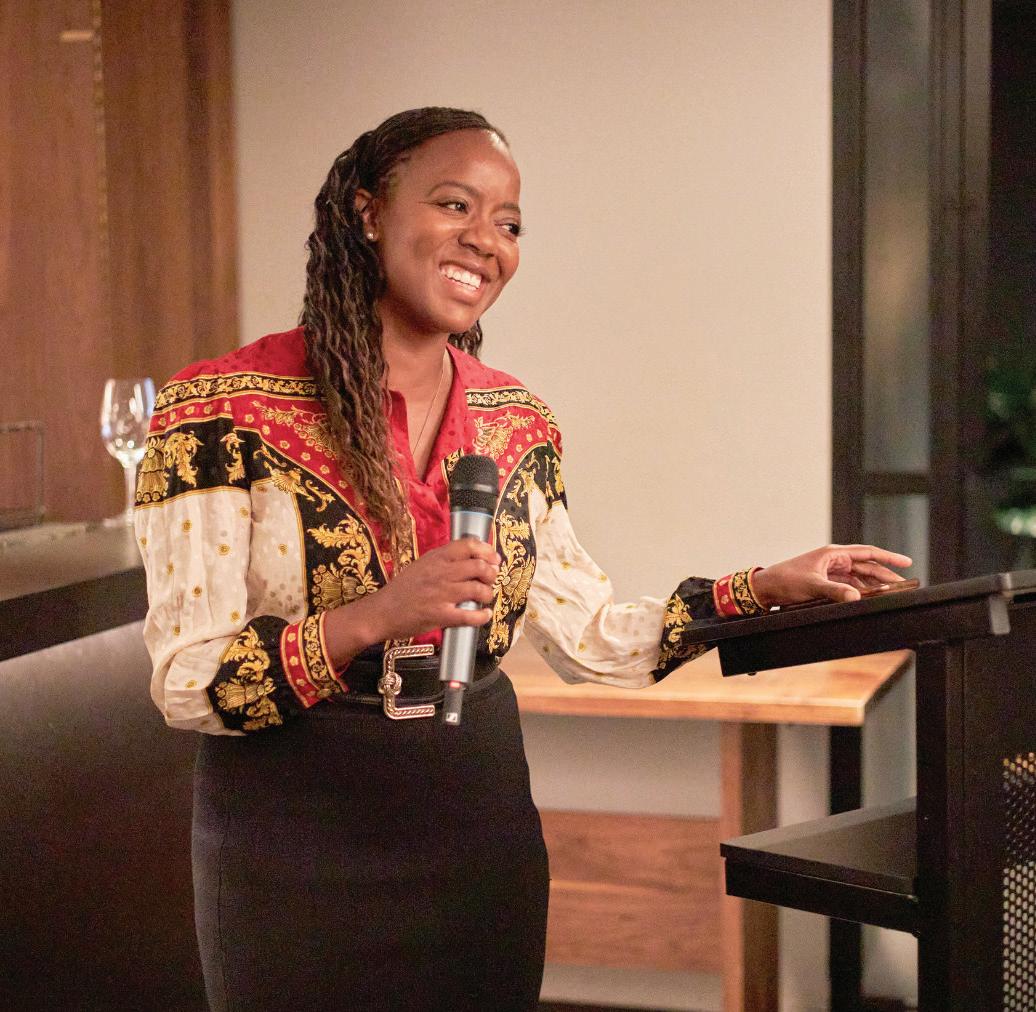
House Athletics was a success this year with Tripp House the overall winner, making up for their heartbreaking loss by 1 point last year to win by nearly 100 pts this year.
This is the first time Tripp have won House Athletics since 1984, so the Tripp Captains were ecstatic to break the drought!
The individual champions were: Junior Champion - Symone Adeleja
Intermediate Champion - Signe Hardt & Miranda Aumont
Senior Champion - Sarai Hughes

The Autumn Concert saw over 230 students from ELC - Year 12 perform in 15 ensembles ranging from String Orchestras to Concert Bands, Choirs, Jazz Bands, Guitar Ensembles and our Pan-Asia, J-pop band. Congratulations to our wonderful music students and staff for a fantastic show!

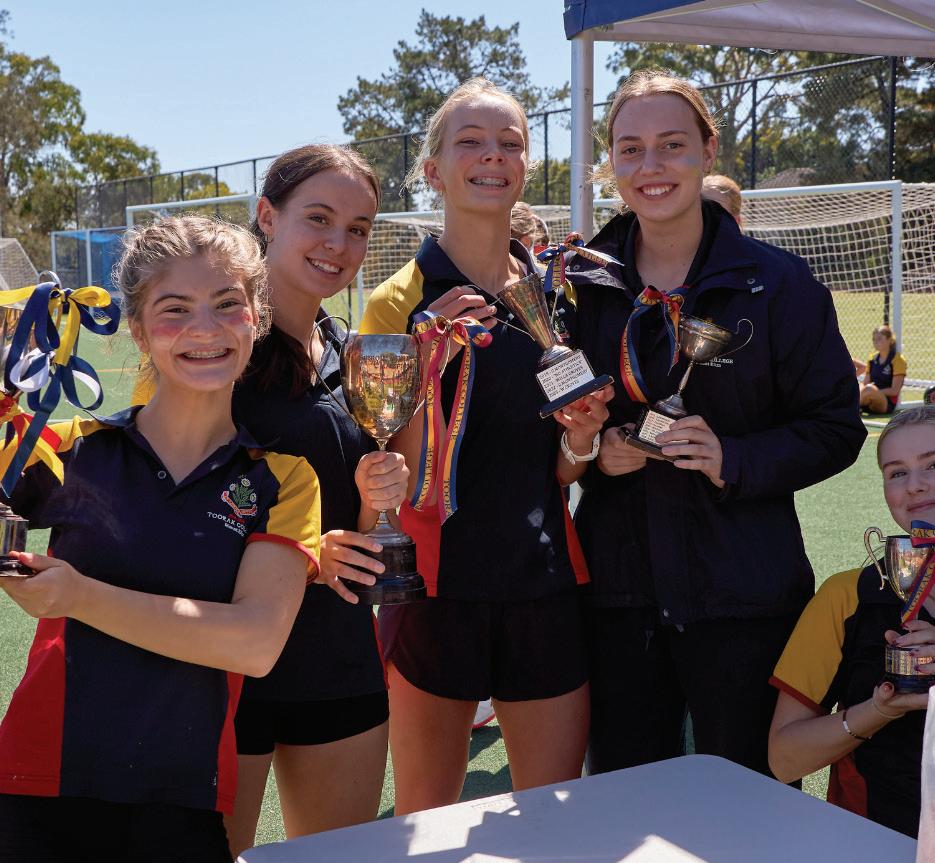
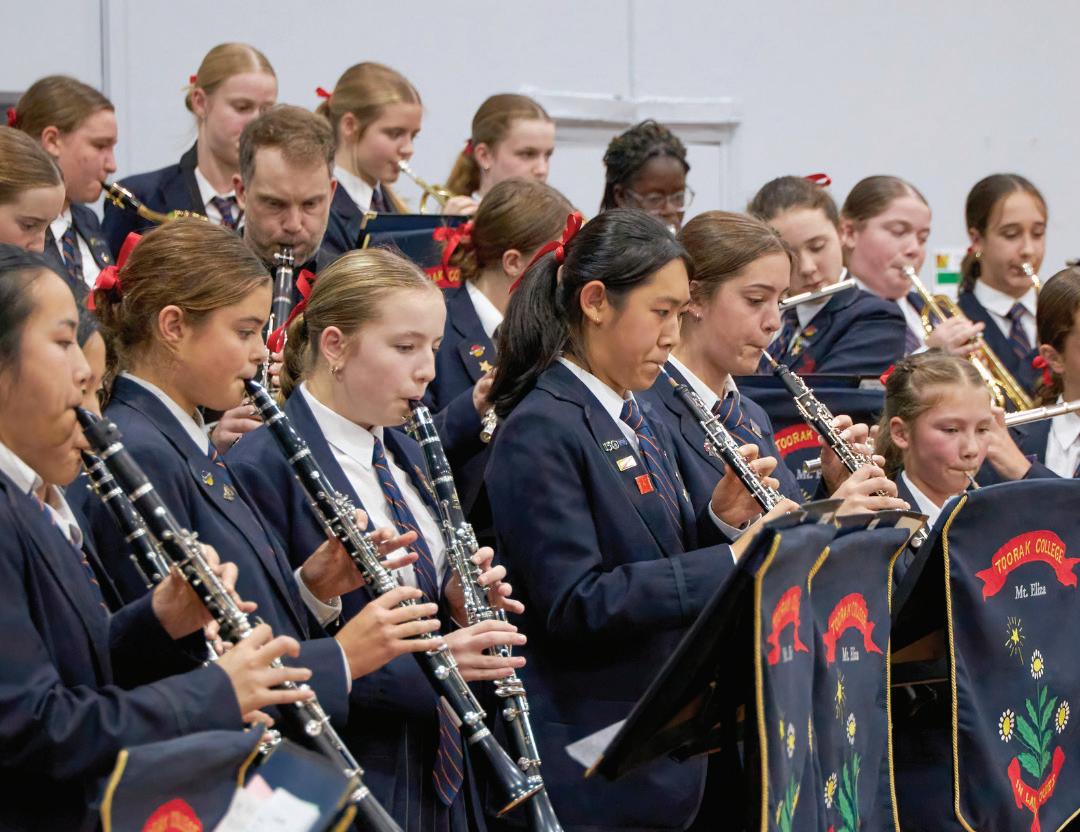
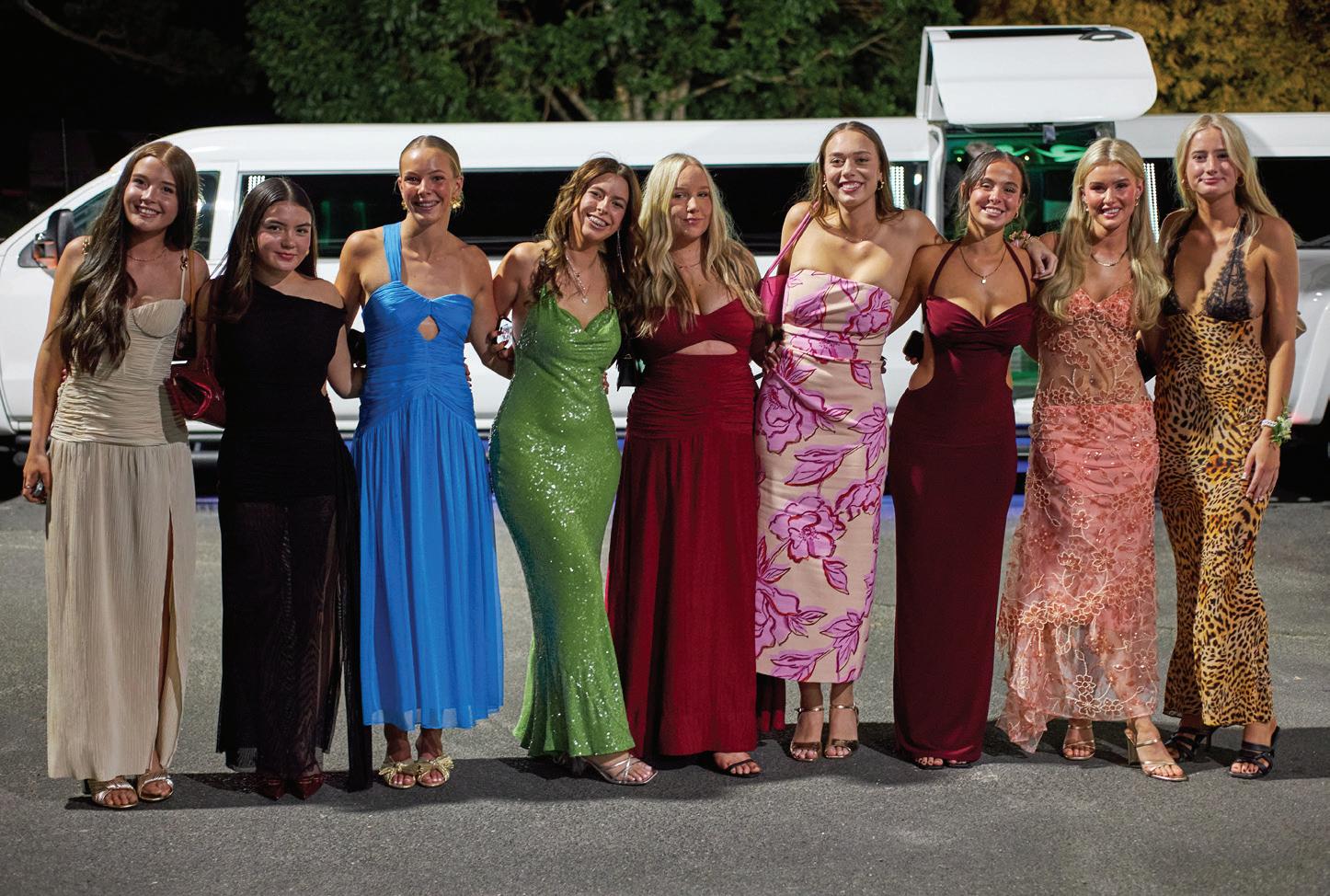

Welcoming students back in Term 1, we celebrated the first of many events for our 150th year, The Summer Festival. It was a wonderful event, with food trucks, giant slides, music, bubbles and lots of fun.
Our Year 11 students celebrated their formal and it was a fantastic night filled with dancing, singing and spending time together as a year level. All of the students looked fabulous, letting their hair down and enjoying an evening together.

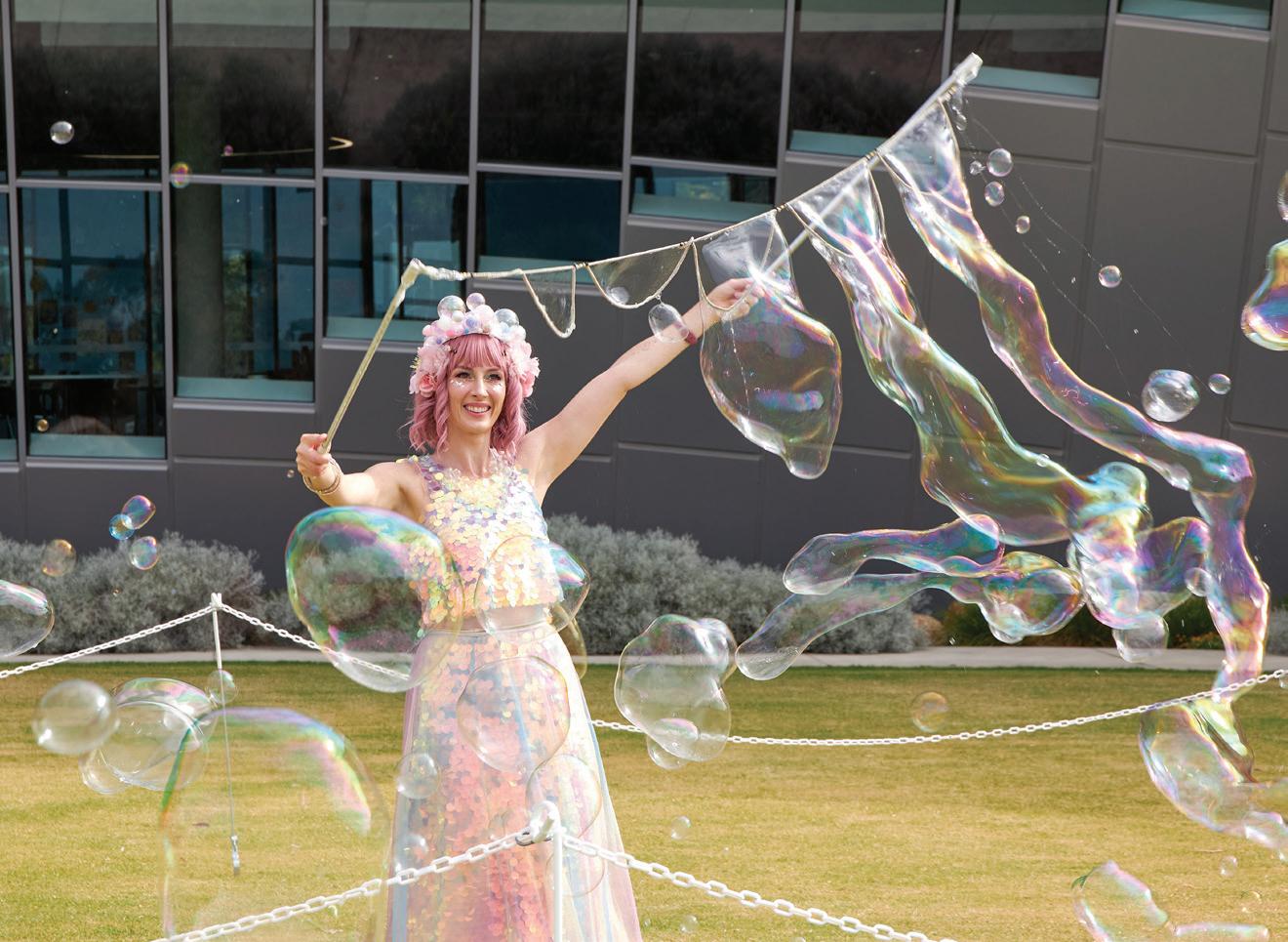



The Easter Bonnet Parade did not disappoint this year, with our Wardle House students showcasing outstanding creativity and flair. We saw a variety of wonderful hats, bunny ears, carrots and more, celebrating the much-anticipated arrival of the Easter Bunny.
As Toorak College embarks on its 150th year, we're thrilled to unveil a dynamic timeline of events celebrating our rich legacy of empowerment and education. Join us throughout the year as we mark this milestone with an array of exciting and meaningful activities.
A Red Ribbon Runs Through It book launch and Tour of Toorak experience
SEPTEMBER
Grand Opening of the Community and Arts Precinct
18 SEPTEMBER
Founders Day Assembly and 150 Performance Event
OCTOBER
150th edition of Speech Night
In 1926, co-principals Misses Isabel Hamilton and Robina Hamilton conceived a vision to relocate Toorak College from its Mayfield Avenue, Toorak location to the countryside as a way to provide their students with fresh air and ample space to thrive. They purchased land in Mount Eliza, and in September 1928, the first assembly was held at the newly-built school. In the process of relocating, one of the wooden buildings was to be transported. On hearing this news, school parent and chairman of the Board, Mr George Russell, was said to have exclaimed, ‘You are surely not taking that white elephant!’ The name ‘The Elephant’ stuck, and that same building was used for the next 40 years as an assembly hall, classroom, and theatre before being demolished in 1972.
The name, 'The Elephant', now lives on in this publication.
Toorak College is committed to ongoing environmental initiatives and sustainability. This publication is printed on
Old Mornington Road, Mount Eliza, VIC, 3930 PO Box 150, Mount Eliza, VIC, 3930
T: +61 (3) 9788 7200 www.toorakcollege.vic.edu.au